- Application guidance

Statement of purpose (SOP) for PhD: How to Write and Samples

Securing admission to PhD programs in the university of your dreams might seem difficult—however, it is not impossible. If you can convince the selection committee of your dedication and genuine interest in your research topic, you stand a fair chance of getting that seat. The key to your admission lies in a well-crafted and compelling statement of purpose that will sway the decision-makers in your favour.
A statement of purpose is your chance to prove to the admissions committee that you have the potential and skills as a researcher. If you are hoping to pursue a PhD, you must put in the time and effort to craft an impressive SOP. This blog will help you understand how to write an interesting yet concise SOP with examples.
Table of Contents
- How to Write a Statement of Purpose (SOP) for a PhD
General Examples of Statement of Purpose for PhD
- 10 Steps to writing an SOP for a PhD course
How to Write a Statement of Purpose (SOP) for a PhD Course?
Your statement of purpose for PhD must express your sincere interest in the subject matter. The following 10 tips will help you to draft an impactful SOP:
10 Steps to writing an SOP for a PhD course
- Introduce yourself:
The whole purpose of the essay is to show the university who you are and your goals. It is better to get straight to the point and explain what inspired you to take up research in your particular field of study. Even if you do not have full clarity on your research topic, you can talk about what you are interested in exploring. Make sure you explain your field learning and what made you take up the specific topic.
- Answer the question, "Why":
Next, it's time to answer some questions. Why do you want to obtain this degree? Why did you choose this particular field of study? Why have you chosen this university to pursue your higher education?
- Explain how you will be a good fit:
It would help if you answered why you think you will be a good fit for the program and why they should consider you a potential candidate. For this, you should have a relatively strong knowledge of the program to express how your interests align with it.
- Express your intellectual curiosity:
You can discuss what excites you about the program and your chosen field of study. Explain why you enjoy doing research and ensure to substantiate your claims with relevant examples.
- Demonstrate your skillset and experience
In this section, you can highlight any previous experience you have in doing research and explain briefly about it. You can also describe the skills that you think might be relevant. For instance, you can mention your skills in programming languages like C++ and Python if you are doing research in the field of Computer Science. Make sure to mention the recognitions you have received for the skills.
- Mention work experience, if any
If you have any relevant work experience, be sure to mention it in your Statement of Purpose for PhD. However, only emphasise this experience if it is directly related to your proposed research.
- Be open about any past setbacks:
If you have any "black marks" on your record, such as poor grades, leaving a college program or any other issues, it is strongly advised that you do not try to hide these from the admissions committee. Instead, address them head-on in your letter. Showing how you successfully rebounded from setbacks will bode well for you.
- Short and long-term goals:
It's always good to give a brief of your short-term and long-term goals and how this degree will assist you in achieving them. It is also essential to consider any future research areas you may want to explore and how they could potentially impact the community. Your vision for your career 10-15 years from now is a crucial indicator of your thought process and how you plan to integrate your degree into your life.
- Edit and proofread several times:
To avoid your essays having any typos, poor grammar or other mistakes that could have easily been fixed, ensure that you always edit and proofread your work. A well-written essay is a sign of a competent researcher.
- Circulate your statement:
Asking your recommendation writers to review your college application essays is a great way to get feedback. It will also help ensure that what they write is consistent with your thoughts and experiences. If you have drafts of your essay completed early enough, don't hesitate to ask for their input. Most faculty members are more than willing to help their former students, given adequate notice.
Read more: How to write an effective statement of purpose?
If you are looking for PhD SOP samples, it is essential to remember that there is a specific way to provide all of your relevant information to the institutions. It is crucial to keep your statement concise but informative. Here are two samples to help you give an idea.
PhD SOP Sample 1
I've always been interested in how physics can explain the things we see and experience in our everyday lives and phenomena beyond our usual perception. My childhood fascination with Physics led me to choose my college major and, ultimately, my career path.
My interest in complex phenomena only grew during my studies. I am passionate about understanding the impacts of radioactive waste on our world. I pursued an interdisciplinary degree in Physics and Environmental Science to develop the skills needed to become a researcher in this field. My goal is to find effective methods for reducing the harmful effects of radioactive waste on our environment.
After completing my degree, I gained valuable work experience at an Environmental Protection Agency, where my responsibilities included examining sites for radioactive leakage and measuring the damage. This experience motivated me to pursue a PhD in Physics so I could find ways to control such situations. I want to be equipped with the necessary knowledge that will allow me to conduct meaningful research and find effective ways of managing radioactive waste.
The University of Essex is my top choice for several reasons. First and foremost, it has an excellent reputation. Secondly, the opportunities and mentorship available for the particular subject are incomparable. And finally, I know that I would be able to make a meaningful contribution to the community here. I am confident that my practical experience and strong motivation will be significant assets as I pursue my studies and career.
PhD SOP Sample 2
My parents are farmers, and I grew up helping them with crop production and food preparation. I was always curious about the scientific basis for farming, canning, and cooking methods, which led me to major in nutrition and food science. I want to understand the science behind what my family has been doing for generations and use that knowledge to improve our food habits.
I completed my undergraduate studies in biotechnology and then went on to do a master's in food technology. For my dissertation, I chose the topic of "XXX", which was of great interest to me. My training at XYZ gave me insight into industrial-level operations concerning nutrition, microbiology and contaminants in the food industry.
Whilst doing my master's, I became particularly interested in food safety and quality assurance, as well as post-harvest technology of fruits and vegetables, food processing and bioprocess engineering. I did a little project on "ABC" and wrote my dissertation on "XYZ". Through working in various laboratories across the country during my studies, I gained experience with multiple techniques used in food preservation.
I am passionate about researching food commodities, fruits and vegetables, and their wastage to synthesise nutritional and bioactive components and convert them into functional foods. I believe that food safety is of the utmost importance, and I hope to learn more about this topic through this doctoral program.
There are numerous reasons for choosing Southern Cross University, and one of the main reasons is your highly competent faculty. The research work done by Prof. ABC on Fruits and Vegetables sparked my interest. I am interested in researching independently and working collaboratively with a team on projects that directly impact smaller communities and society as a whole. I am sure that Southern Cross University will help me achieve my goals and better serve society. I promise you won't find me lagging in my quest or effort, and I pledge to do my best in all the assigned tasks.
Related Articles
- Statement of purpose for MBA courses
- Difference between an SOP and a Personal Statement?
- SOP for Data Science
- SOP for undergraduate courses
- SOP for ms programs
- SOP writing tips
- SOP samples to study in Canada
Frequently Asked Questions
Loved the blog help us reach more students, about the author.

Meet the creative minds behind the content you love in the website ! We're not just any writers; we're your go-to pals when it comes to navigating the world of education. Passionate and committed, our team aims to help you find your dream course by breaking down complex jargon into easy-to-understand language. Overwhelmed by course choices? No worries! We roll up our sleeves to sift through every option, making your search not just easy, but downright enjoyable. Got questions or want recommendations? We're all ears and always excited to help. From deep dives into course specifics to keeping you entertained and informed, we're with you every step of the way. So if you're on the hunt for the perfect course, look no further—AECC Search has got your back from A to Z. Ready to embark on this journey with us? Let's go!
Fulfil your Futuristic Academic Goals with AECC

Top 10 Toughest Exams in the World

List of Difference Between sop and personal statement

Top Exams to Study Abroad

How to write SOP for ms programs

Technical Vocational Courses for International Students
- Study in Australia
- Study in New Zealand
- Study in UK
- Study in USA
- Study in Canada
- Study in Ireland
- Study in Germany
- Study in Singapore
- University Search
- Scholarships
- Career Search
- Destination Search
- Talk to a Counsellor

How to Write a Statement of Purpose for Graduate School

Congrats! You’ve chosen a graduate program , read up on tips for applying to grad school , and even wrote a focused grad school resumé . But if you’re like many students, you’ve left the most daunting part of the application process for last—writing a statement of purpose. The good news is, the task doesn’t have to feel so overwhelming, as long as you break the process down into simple, actionable steps. Below, learn how to write a strong, unique statement of purpose that will impress admissions committees and increase your chances of getting into your dream school.
What is a statement of purpose?
A statement of purpose (SOP), sometimes referred to as a personal statement, is a critical piece of a graduate school application that tells admissions committees who you are, what your academic and professional interests are, and how you’ll add value to the graduate program you’re applying to.
Jared Pierce, associate director of enrollment services at Northeastern University, says a strong statement of purpose can be the deciding factor in a graduate student’s admission.
“Your statement of purpose is where you tell your story about who you are and why you deserve to be a part of the [university’s] community. It gives the admissions committee the chance to get to know you and understand how you’ll add value to the classroom,” he says.
How long should a statement of purpose be?
“A statement of purpose should be between 500 and 1,000 words,” Pierce says, noting that it should typically not exceed a single page. He advises that students use a traditional font at a readable size (11- or 12-pt) and leave enough whitespace in the margins to make the statement easy-to-read. Make sure to double-space the statement if the university has requested it, he adds.
Interested in learning more about Northeastern’s graduate programs?
Get your questions answered by our enrollment team.
REQUEST INFORMATION
How to Write a Statement of Purpose: A Step-by-Step Guide
Now that you understand how to format a statement of purpose, you can begin drafting your own. Getting started can feel daunting, but Pierce suggests making the process more manageable by breaking down the writing process into four easy steps.
1. Brainstorm your ideas.
First, he says, try to reframe the task at hand and get excited for the opportunity to write your statement of purpose. He explains:
“Throughout the application process, you’re afforded few opportunities to address the committee directly. Here is your chance to truly speak directly to them. Each student arrives at this process with a unique story, including prior jobs, volunteer experience, or undergraduate studies. Think about what makes you you and start outlining.”
When writing your statement of purpose, he suggests asking yourself these key questions:
- Why do I want this degree?
- What are my expectations for this degree?
- What courses or program features excite me the most?
- Where do I want this degree to take me, professionally and personally?
- How will my unique professional and personal experiences add value to the program?
Jot these responses down to get your initial thoughts on paper. This will act as your starting point that you’ll use to create an outline and your first draft.
2. Develop an outline.
Next, you’ll want to take the ideas that you’ve identified during the brainstorming process and plug them into an outline that will guide your writing.
An effective outline for your statement of purpose might look something like this:
- An attention-grabbing hook
- A brief introduction of yourself and your background as it relates to your motivation behind applying to graduate school
- Your professional goals as they relate to the program you’re applying to
- Why you’re interested in the specific school and what you can bring to the table
- A brief summary of the information presented in the body that emphasizes your qualifications and compatibility with the school
An outline like the one above will give you a roadmap to follow so that your statement of purpose is well-organized and concise.
3. Write the first draft.
Your statement of purpose should communicate who you are and why you are interested in a particular program, but it also needs to be positioned in a way that differentiates you from other applicants.
Admissions professionals already have your transcripts, resumé, and test scores; the statement of purpose is your chance to tell your story in your own words.
When you begin drafting content, make sure to:
- Provide insight into what drives you , whether that’s professional advancement, personal growth, or both.
- Demonstrate your interest in the school by addressing the unique features of the program that interest you most. For Northeastern, he says, maybe it’s experiential learning; you’re excited to tackle real-world projects in your desired industry. Or perhaps it’s learning from faculty who are experts in your field of study.
- Be yourself. It helps to keep your audience in mind while writing, but don’t forget to let your personality shine through. It’s important to be authentic when writing your statement to show the admissions committee who you are and why your unique perspective will add value to the program.
4. Edit and refine your work.
Before you submit your statement of purpose:
- Make sure you’ve followed all directions thoroughly , including requirements about margins, spacing, and font size.
- Proofread carefully for grammar, spelling, and punctuation.
- Remember that a statement of purpose should be between 500 and 1,000 words. If you’ve written far more than this, read through your statement again and edit for clarity and conciseness. Less is often more; articulate your main points strongly and get rid of any “clutter.”
- Walk away and come back later with a fresh set of eyes. Sometimes your best ideas come when you’re not sitting and staring at your computer.
- Ask someone you trust to read your statement before you submit it.
Making a Lasting Impression
Your statement of purpose can leave a lasting impression if done well, Pierce says. It provides you with the opportunity to highlight your unique background and skills so that admissions professionals understand why you’re the ideal candidate for the program that you’re applying to. If nothing else, stay focused on what you uniquely bring to the classroom, the program, and the campus community. If you do that, you’ll excel.
To learn more tricks and tips for submitting an impressive graduate school application, explore our related Grad School Success articles .
Editor’s note: This article was originally published in March 2017. It has since been updated for thoroughness and accuracy.
Subscribe below to receive future content from the Graduate Programs Blog.
About shayna joubert, related articles.

Why Earn a Professional Doctoral Degree?

5 Tips to Get the Most out of Grad School

Is Earning a Graduate Certificate Worth It?
Did you know.
Advanced degree holders earn a salary an average 25% higher than bachelor's degree holders. (Economic Policy Institute, 2021)
Northeastern University Graduate Programs
Explore our 200+ industry-aligned graduate degree and certificate programs.
Most Popular:
Tips for taking online classes: 8 strategies for success, public health careers: what can you do with an mph, 7 international business careers that are in high demand, edd vs. phd in education: what’s the difference, 7 must-have skills for data analysts, in-demand biotechnology careers shaping our future, the benefits of online learning: 8 advantages of online degrees, the best of our graduate blog—right to your inbox.
Stay up to date on our latest posts and university events. Plus receive relevant career tips and grad school advice.
By providing us with your email, you agree to the terms of our Privacy Policy and Terms of Service.
Keep Reading:

The 8 Highest-Paying Master’s Degrees in 2024

Graduate School Application Tips & Advice

How To Get a Job in Emergency Management

Join Us at Northeastern’s Virtual Graduate Open House | March 5–7, 2024
Recently viewed courses
Recently viewed.
Find Your Dream School
This site uses various technologies, as described in our Privacy Policy, for personalization, measuring website use/performance, and targeted advertising, which may include storing and sharing information about your site visit with third parties. By continuing to use this website you consent to our Privacy Policy and Terms of Use .
COVID-19 Update: To help students through this crisis, The Princeton Review will continue our "Enroll with Confidence" refund policies. For full details, please click here.
How to Write a Statement of Purpose for Graduate School
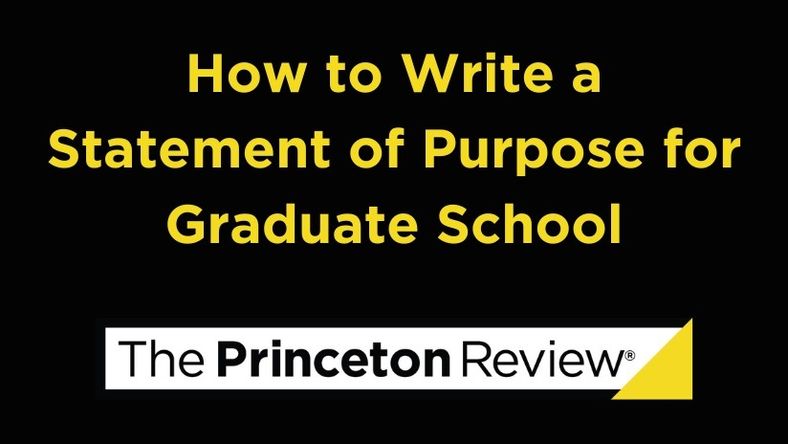
When writing your statement of purpose for graduate school, focus on your specific plans and how the graduate program and its faculty will help you meet these goals. Graduate study is not for slackers. It takes focus and determination to pursue an advanced degree. That's why admissions committees examine your statement of purpose (also called a letter of intent or research statement) very closely—they want to see whether you have the right stuff to succeed in grad school. Follow these tips to write an effective graduate school statement of purpose.
1. Know what grad schools are really asking.
Different grad school programs have different prompts. Nonetheless, they're all asking for the same four pieces of information:
- What you want to study at graduate school?
- Why you want to study it?
- What experience you have in your field?
- What you plan to do with your degree once you have it?
Admissions committees look for candidates with clear, well-defined research interests that arise from experience. With that in mind, your statement of purpose should reveal that you care deeply about your chosen discipline and that you have the background to support your ideas and sentiments. It should also demonstrate that you're a diligent student who will remain committed for the long haul. Always answer the question asked of you. Being substantive and direct is much better than being creative or flashy.
2. Be selective about the details you include.
Grad schools don’t care that you make a great chicken casserole or play intramural bocce ball. They do care about those activities that speak to your suitability for graduate work. As a graduate student, you'll be called upon to do difficult coursework and research. You may have to teach undergraduate classes within your field and conceivably even design a course. And you'll have to get along with a diverse group of colleagues who will sometimes work very closely with you. Any experience in school, work, or your extracurricular life that speaks to those abilities is worth talking about.
Read More: 5 Tips for Choosing a Grad School
3. Make your statement of purpose unique.
While it's important to be focused, there's no need to be boring. To distinguish your essay, add unique (yet relevant) information. One of the best ways to do this is to discuss—briefly—an idea in your field that turns you on intellectually. It's an effective essay-opener, and it lets you write about something besides yourself for a bit.
Remember, the idea you choose to talk about can tell an admissions committee a lot about you. And it demonstrates your interest in your field, rather than just describing it.
4. Ask for feedback.
Be sure to show your statement of purpose to someone you respect, preferably the professors who are writing your recommendations, and get some feedback on the content before you send it in. Have someone else proofread your essay for spelling and grammar. A fresh set of eyes often picks up something you missed.
Finally, don't just reuse the same statement of purpose for each school to which you apply. You can recycle the same information, but make sure you change the presentation to fit each individual program.
Grad School Search
Browse grad school programs by size, location, and more to find your best fit.
Find Your Grad School

Explore Graduate Programs for You
Explore our featured graduate schools & programs to find those that both match your interests and are looking for students like you.

Best Law Schools
Check out our complete list of 168 law schools, based on surveys of school administrators and over 17,000 students.

Search for Medical Schools
Our medical school search allows you to refine your search with filters for location, tuition, concentrations and more.

Find MBA Programs Matched to Your Interests
Explore our featured business schools to find those that are looking for students like you.
What would you score on the MCAT today?
Thank you! Look for the MCAT Review Guide in your inbox.
I already know my score.
Enrollment Advisor
1-800-2REVIEW (800-273-8439) ext. 1
1-877-LEARN-30
Mon-Fri 9AM-10PM ET
Sat-Sun 9AM-8PM ET
Student Support
1-800-2REVIEW (800-273-8439) ext. 2
Mon-Fri 9AM-9PM ET
Sat-Sun 8:30AM-5PM ET
Partnerships
- Teach or Tutor for Us
College Readiness
International
Advertising
Affiliate/Other
- Enrollment Terms & Conditions
- Accessibility
- Cigna Medical Transparency in Coverage
Register Book
Local Offices: Mon-Fri 9AM-6PM
- SAT Subject Tests
Academic Subjects
- Social Studies
Find the Right College
- College Rankings
- College Advice
- Applying to College
- Financial Aid
School & District Partnerships
- Professional Development
- Advice Articles
- Private Tutoring
- Mobile Apps
- Local Offices
- International Offices
- Work for Us
- Affiliate Program
- Partner with Us
- Advertise with Us
- International Partnerships
- Our Guarantees
- Accessibility – Canada
Privacy Policy | CA Privacy Notice | Do Not Sell or Share My Personal Information | Your Opt-Out Rights | Terms of Use | Site Map
©2024 TPR Education IP Holdings, LLC. All Rights Reserved. The Princeton Review is not affiliated with Princeton University
TPR Education, LLC (doing business as “The Princeton Review”) is controlled by Primavera Holdings Limited, a firm owned by Chinese nationals with a principal place of business in Hong Kong, China.
8 Tips for Writing a Statement of Purpose
The statement of purpose, sometimes called a personal statement, is an essential part of PhD applications. It functions similarly to a cover letter; it should convince the reader (in this case the selection committee) that you have the right qualifications, motivation and professional goals to pursue graduate studies in their program. Use the tips below to write a statement of purpose that stands out.
This first tip is the most important. It is essential that you customize your statement of purpose to every school, program, or project that you apply to. You don't have to start from scratch for each statement of purpose, but you should make sure that significant portions of the document are school-specific. Your statement of purpose should tell the committee why you chose to apply to their school over other options.
Show Your Qualifications
Explain why you are qualified for this PhD program. Include a brief summary of your undergraduate and previous graduate career (if applicable). Talk about the research projects you conducted and your thesis or any resulting publications. Mention any relevant scholarly extracurricular activities you were involved in. If there are special requirements for the program, such as foreign language proficiency or prerequisite courses, you should explain how you fulfilled them in your statement of purpose.
Explain Your Interests
Your research interests should be a major part of your statement of purpose. Set up the topic you want to research by indicating a theme, defining a problem, or posing a question. Talk about what inspired your interest in this topic and how it will contribute to the field and the current state of scholarship.
Show Them You Belong
Your statement of purpose should connect your research interests to the school you are applying to. You should name professors with parallel interests who you would like to work with and use specific examples of their work to explain why. Be explicit about how this school will help you succeed in your research goals. Is the department known for taking a unique approach or having a strong focus in a particular area? Do they have special access to resources that will help you research? This paragraph will have to be tailored to each school you apply to.
Unless a specific word count is mentioned in the application, the statement of purpose should not be longer than one to two pages. Make every word count.
Don’t Tell Your Life Story
On a similar note, avoid excess storytelling in your statement of purpose. Don’t waste your limited space telling the committee how you’ve always wanted to be a physicist or about the moment that sparked your passion for history. They already know you’re passionate about the subject—you wouldn’t be applying for a PhD if you weren’t! While your past achievement have prepared for this PhD program, the statement of purpose should focus on your future as a scholar.
Ask For Feedback
When you have written a draft you are satisfied with, ask one of a professor in your field who knows you and your interests to read it over. They can help you see your statement of purpose from the perspective of someone with experience on admissions committees.
This is the crucial last step for any application. Read your statement of purpose over several times to make sure there are no typos or grammatical errors. It can be hard to spot errors on the screen, so print out your statement and read it over. Double check that you have spelled the professors’ names and titles of their work correctly. If grammar isn’t your strong suit (or even if it is) it’s a good idea to ask someone else to proofread your statement of purpose as well.
Discover related jobs
Discover similar employers
Accelerate your academic career
10 Dissertation Writing Tips
The thesis is the capstone of your Master’s or PhD. It’s also an intimid...
Spanish Academic Job Titles
While there will be some differences university to university, here's a ...
Major PhD Fellowships
Looking for a way to fund your PhD? Here are several full and partial sc...
Manhattan Has Two Genetically Distinct Groups of Rats
Brown rats are nearly entirely dependent on humans for resources, which ...
How to Write a Professional Academic CV
No matter what stage you are at in your academic career, having an acade...
Swedish Academic Job Titles Explained
Here is a breakdown of the most common Swedish academic job titles and t...
Jobs by field
- Machine Learning 198
- Electrical Engineering 196
- Artificial Intelligence 193
- Programming Languages 160
- Molecular Biology 134
- Materials Engineering 111
- Electronics 108
- Management 106
- Mechanical Engineering 106
- Materials Chemistry 105
Jobs by type
- Postdoc 350
- Assistant / Associate Professor 244
- Professor 158
- Researcher 124
- Research assistant 104
- Lecturer / Senior Lecturer 94
- Tenure Track 87
- Management / Leadership 72
- Engineer 69
Jobs by country
- Belgium 309
- Netherlands 229
- Finland 124
- Switzerland 122
- Germany 117
- Luxembourg 99
Jobs by employer
- KU Leuven 98
- University of Luxembourg 97
- Mohammed VI Polytechnic Unive... 84
- Eindhoven University of Techn... 83
- Ghent University 69
- ETH Zürich 60
- University of Twente 59
- KTH Royal Institute of Techno... 47
- Wenzhou-Kean University 35
This website uses cookies

Flawless Statement Of Purpose For PhD: Samples & Tips
As an aspiring PhD student, you’ve probably heard it time and time again – your statement of purpose (SOP) is one of the most important elements of your application. In just a few short pages, the admissions committee needs to understand your research interests, fit for the program, and long-term career goals. It’s no small feat to efficiently and powerfully convey all this within the character limit restrictions. That’s why we are here to walk you through everything you need to know to create the perfect SOP and bolster your chances of admissions success. In this post, we’ll unpack the anatomy of a compelling SOP, including essential components and structure. We’ll also share statement of purpose for PhD samples from both real and fictional but effective essays to give you a sense of the different styles and tones you can take.Finally, we’ll provide my top writing and editing tips to help you put your best foot forward and craft the type of polished, punchy statement that makes admissions officers eager to admit you into their program. Let’s dive in and get started on building your application’s most pivotal piece.
Understand the purpose
A statement of purpose for a PhD program is more than just a formal requirement for the application process; it is a critical component that helps the admission committee understand your academic journey, your research interests, and your fit into the program. The SOP serves a dual purpose- it demonstrates your ability to articulate complex ideas clearly and concisely, reflecting your communication skills, and it outlines your intellectual curiosity and dedication to your field of study. The committee uses the SOP to gauge whether your research interests align with those of the faculty, whether you have the potential to contribute significantly to the field, and whether you have the resilience and dedication to withstand the rigors of a PhD program. Essentially, the SOP is your opportunity to convince the committee that you are a compatible candidate for the program and that you have the ambition, curiosity, and academic prowess to succeed.
What your statement of purpose should not do
While your statement of purpose should provide a comprehensive picture of your academic journey, it should not merely rehash what can already be found on your resume or CV. The resume primarily lists your qualifications, the courses you’ve taken, the projects you’ve completed, and the positions you’ve held. Simply repeating these details in your statement does not add any value to your application and can be redundant.
As demonstrated in the statement of purpose for PhD samples below, the aim of the essay is to provide context, explain the motivations behind your academic and professional decisions, and to outline your future research goals and aspirations. Rehashing your resume wastes valuable space that could be used to highlight your research interests, demonstrate your analytical thinking, and elucidate your understanding of the academic field. Moreover, it reflects a lack of creativity and an inability to think critically, traits that are extremely important for a successful PhD candidate. Therefore, it’s crucial to ensure that your SOP goes beyond your resume, offering a deeper insight into your intellectual journey and your commitment to your chosen field of study.
Here is an illustration of how your statement of purpose can provide a comprehensive account of your academic journey without simply echoing your resume or CV:
“As an undergraduate, I was drawn to the complexities and intricacies of molecular biology, a fascination that was kindled during my sophomore year project on DNA replication. This wasn’t simply a course requirement for me, but a thrilling dive into the minuscule yet mighty world of cells and DNA. The project led me to identify my research interest and, subsequently, to choose an internship in a lab specializing in gene editing techniques. This experience allowed me to work with renowned professionals and gain hands-on experience, igniting a desire to contribute meaningfully to this field. My decision to apply for a PhD program in molecular biology stems from this inquisitiveness and the profound desire to delve deeper into the mysteries of genetic codes. If granted the opportunity, my aim is to focus on gene therapy research to combat genetic disorders, a pursuit that I believe can change countless lives. This is not merely an academic endeavor for me; it is my commitment to contribute to a field that holds immense potential for human health.”

Know your audience
Understanding your audience is central to crafting a compelling statement of purpose for a PhD program. When preparing your SOP, consider the specifics of the program and department you’re applying to — what are their research focus areas, what methodologies do they frequently employ, who are the key faculty members, and what are their contributions to the field? Incorporating these details into your SOP will demonstrate that you’ve done your homework and that you’re genuinely interested in the program.
It’s not about pandering to the department; rather, it’s about showing that you’ve taken the time to understand their objectives and that you see a genuine alignment between their work and your research interests. For instance, if the department is known for its focus on quantitative methods, you might want to highlight your experience with these methods and how you plan to utilize them in your research. Similarly, if a faculty member in the department is doing groundbreaking work in your area of interest, mentioning this work and how it aligns with your research goals could work in your favor.
Remember, the SOP is not just about selling your skills and achievements; it’s about weaving a narrative that shows a deep understanding of the program, a clear vision of your research journey, and a firm belief in your compatibility with the department’s goals and values. Among the statement of purpose for PhD samples provided in this blog post, the following one demonstrates how to do just that:
“As an aspiring PhD candidate, I am drawn to the University of XYZ’s Department of Neuroscience due to its renowned focus on neurodegenerative diseases. I have a particular interest in the methodologies that Dr. Jane Doe employs in her groundbreaking research on Parkinson’s disease. Having utilized quantitative methods extensively during my master’s thesis, I plan to further refine these skills to contribute to this field’s evolving discourse. I am particularly impressed by the department’s innovative approach to integrating molecular biology and computational modeling . This aligns closely with my own vision of utilizing a multi-disciplinary approach to understand the complexities of neurodegenerative disorders. My past research endeavors along with my desire to delve deeper into this particular field have equipped me with a unique perspective and a steadfast determination. I firmly believe that the application of my skills and the alignment of our research interests will significantly contribute to the department’s ongoing projects and overarching goals.”
Focus on your research experience
In your statement of purpose, the articulation of past experiences forms a pivotal part. It lays a foundational layer that demonstrates your abilities, commitment, and growth. Each experience that you narrate should be a reflection of your intellectual curiosity, research acumen, and dedication to your chosen field.
This does not mean that you just sequentially list your experiences. Instead, it is essential to focus on those that had a significant impact on your academic journey or shaped your research interests. Discuss your learnings, illustrate how challenges were addressed and remember to underline your contribution to each experience shared.
The idea is to paint a picture of your capabilities, showcasing not just your technical skills, but also your problem-solving ability, perseverance, and team spirit. When an admissions committee member reads your SOP, they should not only grasp your past experiences but also see your potential to effect meaningful change in the future.
As such, your SOP should be a blend of your present and future – a snapshot of who you have been, who you are, and who you aspire to become. Therefore, invest the time to reflect, compose, and meticulously proofread your SOP, as it serves as a powerful tool that can impress the admissions committee, setting you apart from other candidates.
“During my undergraduate studies, I had the opportunity to be a part of a research team working on nano-sensor technology. This experience ignited my passion for nanotechnology and sensor systems, as I found the potential of these technologies in addressing some of the pressing environmental issues remarkable. I contributed to this project by identifying a novel approach for enhancing the sensor’s sensitivity, which was an outcome of my methodical problem-solving approach and rigorous testing. This experience was not without its challenges, and it was during these trying times that my perseverance shone through. There were instances when our team hit roadblocks, but we resolved them collaboratively, highlighting my ability to work effectively in a team. The knowledge and skills that I gained from this experience have significantly influenced my academic path and future aspirations. Now, I aim to delve deeper into this domain in my graduate studies, with the ultimate goal of developing innovative solutions for environmental challenges. I believe that my dedication, combined with my problem-solving skills and team spirit, will enable me to contribute significantly to the ongoing projects at your esteemed institution.”

Highlight your research interests
As shown in the statement of purpose for PhD samples below, general statements about being interested in a broad field, such as ‘molecular biology’ or ‘international relations,’ will not make you stand out. Instead, delve into the intricate aspects of your area of interest, demonstrating your profound understanding and passion for the subject.
For instance, if your research interest lies in the domain of molecular biology, you might specify that you are particularly intrigued by the role of microRNAs in gene regulation and its implications for cancer treatment. If international relations is your field, you might express a keen interest in the interplay of economic sanctions and nuclear disarmament, using specific case studies such as North Korea or Iran.
Back your assertions with evidence of your knowledge and skills – refer to relevant research you’ve done, courses you’ve taken, or seminal literature you’ve read. Tying your research interests to current debates and pressing issues in the field will further underscore your commitment and preparedness for PhD-level work. You also need to mention potential research questions you wish to explore, thereby showcasing your ability to conceptualize and execute research.
Remember, your research interests are the cornerstone of your PhD journey, and the statement of purpose is an opportunity to demonstrate that these interests are informed, well-articulated, and aligned with the department’s expertise.
“My fascination with molecular biology is deeply rooted in the complex world of microRNAs and their potential in gene regulation. I am particularly captivated by the implications this has for cancer treatment, a connection I have explored in my undergraduate research examining the role of microRNA-155 in breast cancer progression. This research, coupled with my advanced coursework in cellular biology and genetics, has equipped me with a robust understanding of the molecular mechanisms driving disease. Furthermore, my keen interest extends to pressing debates in the field, as I am actively engaged in studying the potential of microRNAs as therapeutic targets. Looking forward, I wish to delve deeper into this area during my PhD, with an initial research question centered around understanding the differential expression patterns of microRNAs in various cancer types. I am confident that the department’s expertise in molecular biology, notably the groundbreaking work on microRNA-based therapies, aligns perfectly with my research interests, and I am excited about the possibility of contributing to this pioneering field.”
Emphasize your motivation
Your motivation is the driving force behind your aspiration to pursue a PhD, and it is crucial to articulate this effectively in your statement of purpose . It is not enough to merely state that you are passionate about your subject; you need to demonstrate your commitment and dedication through tangible examples and anecdotes.
For instance, you might talk about a seminal moment or experience that sparked your interest in the field – perhaps a particular course you took or a paper you read that opened up a new perspective. You might recount how you pursued this interest, undertaking independent reading, engaging in research projects, or seeking out mentors in your field. You might discuss how these experiences fueled your passion further, inciting an insatiable curiosity and a determination to contribute to the field.
Convey how your subject has influenced your worldview, shaped your career goals, and ingrained a sense of purpose and direction in your life. This passion should seep into every facet of your statement of purpose, presenting a compelling narrative that resonates with the admissions committee. Ultimately, your motivation should underscore your willingness to embrace the rigors of a PhD program, your readiness to delve deeper into your field, and your ambition to make a profound impact on it.
“My fascination with neurobiology was truly sparked when I took an introductory course in my sophomore year of undergraduate studies. The intricate workings of the human brain and how it influences behavior captivated me. I sought to dive deeper into this subject, undertaking independent reading beyond the scope of my coursework. I also volunteered for a research project under the guidance of a respected professor in the field. This hands-on experience introduced me to the thrill of discovery and the satisfaction of contributing to scientific knowledge. These experiences reinforced my passion for neurobiology, instilling an insatiable curiosity and a determination to delve deeper. Today, this subject has evolved from merely an academic interest to a defining aspect of my life, shaping my career aspirations and directing my purpose. My motivation to pursue a PhD stems from this profound desire to deepen my understanding, participate in groundbreaking research, and ultimately contribute significantly to our understanding of the human brain.”

Discuss your qualifications
Your qualifications form a significant part of your application and should be highlighted effectively in your statement of purpose. Start by discussing your academic background, emphasizing the relevance of your degrees, courses, and thesis projects to your proposed area of study.
For example, if you’re applying for a PhD in psychology, you might mention your bachelor’s and master’s degrees in the same field, the psychology courses you’ve mastered, and the dissertation you’ve completed on a related topic.
Next, delve into relevant work experiences, internships, or research projects you’ve partaken in, explaining the insights and skills you’ve gleaned from these opportunities. Be specific about your roles and responsibilities, the methodologies you’ve used, the challenges you’ve overcome, and the results you’ve achieved.
Remember, each aspect of your qualifications should align with your research interests and underscore your readiness for the PhD program.
Show how you can contribute
In the conclusion of your statement of purpose, it’s essential to clearly articulate how you can contribute to the PhD program and the broader academic community. This involves showing how your unique perspectives, experiences, skills, and aspirations can enrich the learning environment, push the boundaries of your field, and address pertinent societal issues.
For example, you might highlight how your innovative research methodology can fill existing gaps in knowledge, how your commitment to mentorship can foster a supportive academic culture, or how your interdisciplinary approach can facilitate collaborations and yield groundbreaking insights.
Be sure to also touch on your long-term career goals, such as becoming a professor, a policy-maker, or a consultant, and explain how these align with the objectives of the PhD program and the institution’s mission. This gives the admissions committee a clear vision of your future trajectory and reassures them of your determination and potential to succeed.
Remember, your conclusion is your final chance to leave a lasting impression, so ensure it’s compelling, coherent, and reflective of your passion, readiness, and potential to excel in the PhD program.
“To conclude, I am keen to join your esteemed PhD program as I see it as a platform where my experiences, skills, and aspirations can have a significant impact. With my in-depth background in environmental science and a passion for data analytics, I intend to explore innovative methodologies that address the pressing issue of climate change. This interdisciplinary approach, I believe, can fill gaps in current research and provide novel insights that could potentially lead to impactful solutions. I am equally committed to fostering a supportive academic culture through active mentorship in the X program, leveraging my experience as a TA during my master’s in Y activities. Looking ahead, my ultimate career goal is to work as a policy consultant, leveraging research to shape powerful environmental policies. I am confident that this aligns with the mission of your institution and the objectives of the PhD program. In summary, I am eager to contribute to the academic community and believe that with my passion, readiness, and potential, I will be a valuable addition to your program.”
Express clearly and concisely
As demonstrated in the statement of purpose for PhD samples above, writing an essay that is clear and concise necessitates a logical structure and a succinct, yet compelling language.
Use simple, direct language, focusing on precision and clarity. Be mindful of wordiness and redundancy, as these can dilute your message and confuse the reader. It’s crucial to use strong, active verbs and to avoid jargon, ensuring that your SOP is accessible and engaging. Breaking down complex ideas into simpler terms not only demonstrates your understanding of the subject but also makes your SOP easier to read.
Each paragraph should flow seamlessly into the next, maintaining a logical progression of ideas. Providing relevant examples and conveying them succinctly can further enhance the clarity and impact of your SOP. Moreover, a well-structured, concise SOP reflects your ability to communicate effectively, a skill integral to any academic pursuit. Whether you’re describing your research interests, academic achievements, or future plans, make every word count.
Remember, your goal is to convince the admissions committee that you are a promising candidate who will contribute positively to their program.
Show, don’t just tell
One of the most persuasive techniques in writing a compelling SOP is to employ a ‘show, don’t tell’ approach. This involves illustrating your claims with vivid examples and stories that demonstrate your qualifications and passion, rather than merely stating them.
For instance, instead of claiming that you have strong research skills, you might describe a complex project that you successfully managed, explaining the strategies you used and the challenges you overcame. You could bring your academic interests to life by detailing the precise moment when you realized your passion for your field of study, whether it was a fascinating lecture, a thought-provoking book, or a groundbreaking research paper.
You can also substantiate your career aspirations by recounting relevant experiences, such as internships, workshops, or leadership roles, that shaped your career goals and prepared you for the future. These narratives not only provide concrete evidence of your attributes but also make your SOP more engaging and memorable.
Be sure to use vibrant language to paint a clear picture and evoke emotions, making your experiences resonate with the reader. Incorporating a personal touch — your unique perspective, insights, or reflections — can give your SOP a distinct voice that stands apart from others.
Through compelling storytelling, you can transform your SOP into a captivating narrative that leaves a lasting impression on the admissions committee.

Warning: The purpose of statement of purpose for PhD samples
When it comes to crafting an impactful statement of purpose, samples can serve as invaluable tools. They offer a glimpse into the structure, content, and tone expected in a well-curated SOP. More than mere templates to be copied, statement of purpose for PhD samples should be viewed as guides for understanding how to articulate your academic and career aspirations effectively. They showcase successful attempts at conveying passion for a field, highlighting academic achievements, and outlining future goals within the constraints of a limited word count.
Despite the benefits of statement of purpose for PhD samples, it’s critical to remember that each SOP is unique and personal. Simply copying a sample would undermine the primary purpose of the SOP: to provide a distinct and authentic narrative of your journey and aspirations. The correct way to utilize these statement of purpose for PhD samples is by analyzing the writing strategies used, deriving inspiration, and then creating an original piece of work that reflects the applicant’s unique story. This approach ensures that the SOP not only meets the formal requirements set forth by the academic institution but also captures the individuality of the applicant, thus making a lasting impression on the admissions committee.
The high stakes of your statement of purpose
Your SOP is much more than a mere component of your application; it is a crucial determinant of your acceptance. This document breathes life into your application, rendering a vivid picture of your past, present, and future aspirations to the admissions committee. Its weight is such that a well-crafted SOP can elevate an otherwise average application, while a poorly constructed one can diminish the impact of an exceptional academic record.
Think of it as a double-edged sword, capable of either bolstering your chances of admission or, alternatively, significantly undermining them. The smallest of errors — be it a grammatical faux pas, a lack of coherence, or a failure to aptly convey your passion — can be detrimental, casting doubt on your abilities and commitment.
On the other hand, a compelling, polished SOP that succinctly encapsulates your journey, goals, and potential can resonate profoundly with the committee, positioning you as a desirable candidate. The stakes, then, are undeniably high. It’s a daunting task to undertake alone, and the margin for error is slim. Assessing your work objectively can be challenging, and subtle nuances may escape your notice. Seeking feedback in this critical endeavor may prove invaluable in ensuring your SOP is not just good, but exceptional.
Let’s recap. As demonstrated through our statement of purpose for your PhD samples, the SOP is one of the most important elements of the application process and needs to distinctly capture your research interests, fit for the program and future aspirations in its few pages. We have provided you with helpful information about components and structure, given real samples to emulate, and shared tips on writing and editing to ensure you submit a top-notch statement that will leave a favorable impression. Now that you know how to write an effective SOP for your PhD application confidently, what are you waiting for? Put your newfound knowledge into action and get started on creating an outstanding SOP that truly speaks for itself. And if you find yourself struggling or needing a bit of guidance along this journey, we offer statement of purpose services – whether it be helping you write your SOP from scratch or providing personalized feedback. Make sure to check them out!
With a Master’s from McGill University and a Ph.D. from New York University, Dr. Philippe Barr is the founder of The Admit Lab . As a tenure-track professor, Dr. Barr spent a decade teaching and serving on several graduate admission committees at UNC-Chapel Hill before turning to full-time consulting. With more than seven years of experience as a graduate school admissions consultant, Dr. Barr has stewarded the candidate journey across multiple master’s programs and helped hundreds of students get admitted to top-tier graduate programs all over the world .
Subscribe to our YouTube c hannel for weekly tutorials on navigating the graduate application process and live Q&A sessions!
Share this:
Join the conversation.
- Pingback: Speech Pathology Statement of Purpose: Examples & Tips -
- Pingback: Statement of Purpose: A Complete No BS Guide -
- Pingback: Your Winning PhD Application Timeline -
- Pingback: How Many PhD Programs Should I Apply to Now? -
Leave a comment
Leave a reply cancel reply, discover more from.
Subscribe now to keep reading and get access to the full archive.
Type your email…
Continue reading
Kshitij Tiwari Ph.D.


Statement of Purpose (SOP) for PhD programs [FREE Template]
When applying for a PhD program, you must do 2 things as pre-work: 1.) Make sure you are convinced that PhD is the right choice for you ; 2.) Make sure you have identified the ideal supervisor .
Once that much is done, the next step is preparing your application packet to start applying for available PhD positions.
As a part of your application packet, you will be required to write a Statement of Purpose, more commonly known as an SOP . It is a 1-2 page essay of up to 1000 words that tells a story about who you are and why you want to pursue a PhD in the subject you have chosen.
Let us look into how to write an engaging SOP for your PhD program and build a FREE to use template that generalizes for various PhD programs.
DISCLAIMER: The template is meant to help you get started with organizing your thoughts. Using this template, by no means is meant to encourage to copy-paste the same SOP across multiple applications. Use this to structure your thoughts and iteratively improve over the write up.
Table of Contents
What is an Statement of Purpose (SOP)?
Is SOP same as Letter of Intent (LOI)?
How to write an sop for phd, [free] sop template, formatting your sop.
- Should you create a unique SOP for each program?
Key takeaways
What is a statement of purpose (sop).
A Statement of Purpose (SOP) is a narrative essay that outlines your academic and professional background, your qualifications, and your reasons for wanting to pursue a doctoral program. It’s an opportunity to showcase your unique experiences and talents and explain how they make you a great fit for the particular school and program. An SOP should be written in a professional yet personal tone, as it should capture your personality, as well as your academic and work experience.
Short answer : No, an SOP and a Letter of Intent (LOI) are not the same. LOI is more of an outline whereas SOP is an in depth statement.
Long answer : An SOP focuses on your academic and professional background, while an LOI focuses more on personal and professional goals and objectives. An SOP should share how your background and experiences have shaped who you are today and how these qualities will enable you to excel in your chosen field. An LOI should be more detailed and specific, and should include more information about your goals and objectives. Additionally, an LOI should provide an overview of you, your skills, and the value you can bring to the program.
Writing an SOP can feel intimidating and overwhelming. However, there are some steps you can take to make the process easier. When writing your SOP, it is important to be honest and sincere. Start by understanding your purpose, writing a clear outline and identifying the key points you want to make. Additionally, use active language and provide evidence to support your claims. Finally, once you have completed your essay, make sure to edit and proofread it thoroughly before submitting.
When writing your SOP, it is important to create an engaging essay that stands out. Make sure to highlight unique elements of your background and experiences, such as your achievements, volunteer work, awards, and other accomplishments. Mention any research you’ve conducted and any internships you’ve completed. This will show the admissions committee that you are committed to the program and the research it encompasses. Additionally, make sure to tell stories, describe how you overcame challenges, and emphasize the impact your work has had on others.
Below is a free SOP template that you can use to get started on writing your own statement for the PhD program of your choice .
The key thing to keep in mind while writing an SOP is to show evidence how you can build on your prior experience to excel in your PhD. It is possible that you may not have the exact skill set or even prior publications but that’s OK as long as you make a convincing case as to how your broader skills generalize.
Think of it this way- you want to convince the University that if given a chance, you are willing to go the extra mile to make sure you succeed and make their investment in you, worthwhile.
Subject: Statement of Purpose for P h D program at [Name of University] *** Introduction *** My name is [Name], and I am applying to the [Name of Program , mention Term for which you are applying ] at [Name of University]. I am a [field] professional with [X] years of experience in the [relevant field]. In the past, I have worked in various capacities, including [list relevant positions], and I am dedicated to furthering my education and pursuing my passion in the field of [field]. *** Body Paragraph 1 *** In my current role as [role – can be as a UG student ], I am responsible for [ broadly list responsibilities]. In this role, I have had the opportunity to \[list accomplishments\] and \[mention research projects\] that I have conducted. I have also gained valuable insights into the field of \[field\] and the potential impact it can have on society. This experience has reaffirmed my commitment to pursuing a P h D and has provided me with the motivation to continue my studies. *** Body Paragraph 2 *** I am confident that the \[Name of Program\] at the \[Name of University\] is the great place for me to continue my studies. I have been impressed by the \[list qualities\] that \[Name of University/Program /Potential supervisor \] has to offer and I am confident that I will receive the support I need to excel in my studies. *** Conclusion *** In conclusion, I am excited for the opportunity to pursue a P h D in \[field\] during \[term\] and I believe that the \[Name of Program\] at \[Name of University\] is the perfect place for me to do so. With my prior experience, knowledge and dedication, I am confident that I will be successful in my studies and make a meaningful contribution to the field of \[field\].
While most of the programs may not impose rigid formatting guidelines, as a rule of thumb, keep your SOP within 1-2 pages. As for the fonts, try using at least 12 pts to make it easier to read, underline the key takeaways so that the reviewers can get the gist even if they glance through it. For page margins, keep the standard page formatting for an A4/ Letter paper.
Should you create unique SOP for each program?
Yes , it is important to create an individual and unique SOP for each program you are applying to. Each program has its own requirements, and your SOP should be tailored to each specific program.
Additionally, it is important to include information that is relevant to the program you are applying to. This will help you stand out to the admissions committee and demonstrate how you can contribute to the program and the field as a whole.
Having a template at hand should help you save some time but that should in no way be an indicate to copy-paste SOPs across applications as this will diminish your chances of standing apart from the rest of the applicant pool.
Writing an SOP is an important part of applying to any PhD program. To be successful, it is important to be honest and sincere, use active language and provide evidence to back up your claims. Additionally, make sure to highlight unique elements of your background and experiences and tell stories that capture your personality and experience. With these tips in mind, you can create an impactful SOP that will be sure to catch the eye of the admissions committee. Finally, make sure to create a unique SOP for each program you are applying to, as this will help you stand out and demonstrate your commitment to the program.
Related resources
- I consent to the having this website store my submitted information as per the privacy policy so they can respond to my inquiry.

Some of these samples have been accepted by top programs. They have been graciously shared by past applicants for educational purposes. We hope they inspire you to write your own.
Drop us a draft of your SOP, PS, LOI, ML, &/or LOR for
- Expert 1 v 1 Guidance (includes reviewing and editing)
- Review and edit
Most reviewed programs
- MS and PhD in Computer science, Data Science, AI, Engineering (MIT, Stanford, Carnegie Mellon, Georgia Tech, Caltec, etc)
- Mathematics
- Biomedical Engineering
- Linguistics and literature
- Film studies
PLACE ORDER
Statement of Purpose for PhD in Computer Science (MIT Accepted)
We analyse three SOP samples, two accepted at MIT and one at the University of Washington.
Statement of Purpose for PhD in Biomedical Engineering (MIT Accepted)
In this article, we analyse a Biomedical Engineering SOP that was accepted at MIT, Stanford, and Georgia Tech
Letters of Recommendation: A Guide and Sample for your Recommenders
Statement of Purpose Sample for Nursing (Undergraduate) (Highly rated)
Description: We describe in detail how to write a statement of purpose for nursing. In the SOP, the applicant underscores the areas of nursing she’d focus on and how she was suited for the school.
Statement of Purpose Sample for Ph. D Nursing (Compelling)
Description: In this Statement of Purpose Sample for Nursing Ph. D, the applicant identifies the field of interest and specialization that he’s interested in early, details professional and research work, then points out the skills he would like to gain from this program and how the university will help in this endeavor.
Statement of Purpose for MBA (Ivy school)
Description: We start by providing a step by step guide that should help with generating ideas for your MBA SOP and then crafting one while adhering to certain tips. We then provide 3 ivy school samples.
Statement of Purpose Sample for Computer Science (Highly rated)
Description: In this Statement of Purpose Sample for Computer Science, the applicant describes how a local mobile money sending application in rural parts of Africa inspired his love for computing. The applicant explains a clear career path after graduating. You can get a similar SOP by ORDERING HERE
Statement of purpose sample for computer science 2 (Recommended)
Description: In this SOP, we provide the blueprint of writing a SOP for computer science. We follow it with two highly rated samples.
Statement of Purpose Sample for Cognitive Science (Good)
Description: In this SOP, the applicant describes how personal struggles with Dyslexia, and the inspiring story of Akeelah in the Akeelah and the Bee film, motivated a desire to understand how the human brain works and how it can be trained to optimize the good while negating the bad.
MBA Statement of Purpose Example (Excellent)
Description: In this Statement of Purpose Sample for MBA, the applicant evokes the loss of family business and a business degree that didn’t equip him with practical skills as the motivation for applying for an MBA. The applicant brings out the steps that he has taken to remedy this lack of practical experience and the skills that he looked forward to getting from the MBA program.
Statement of Purpose Sample for MBA with Engineering Background (Compelling)
Description: The applicant underscores professional experience managing people, financial, and operational processes. He emphasizes possession of transferable research experience, the result of which is a successful Statement of Purpose for MBA that got him acceptance to a top business school. You can get the same HERE
Statement of Purpose Sample for Masters in Public Health Science (Good)
Description: In this SOP, the applicant underscores her teaching and research experience and show how they would be transferred to a role of a public health educator. If you’re applying for university admission in a field other than you did your bachelor’s, we can help with standardizing your SOP. Speak to us today HERE
Statement of Purpose Sample for Psychology Graduate School (Great)
Description: In this SOP, the applicant explains how growing up in a crime-ridden neighborhood with a police father informed her early views on crime prevention and the place of psychology. She places this early observations in their proper context by profiling the background of teenage offenders thereby underling the place of early trauma on future behavior.
Statement of Purpose Sample for Mathematics (Highly rated)
Description: This sample explains the applicant’s love for numbers and top achievement as well as suitability for the university.
Statement of Purpose Sample for Business Management (Highly rated)
Description: The SOP demonstrates how professional experience not deemed relevant to business management may be captured as an example of work ethics
Statement of Purpose Sample for Nursing
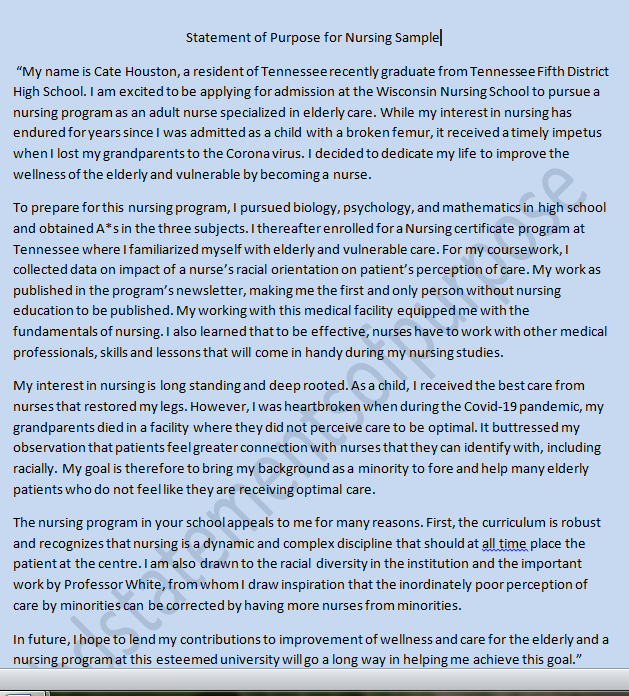
Statement of Purpose Sample for Nursing PhD
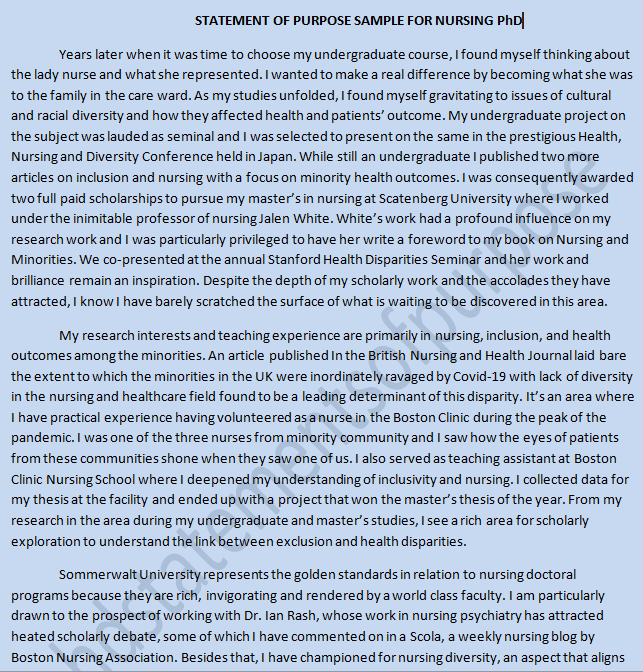
Statement of Purpose sample for MBA
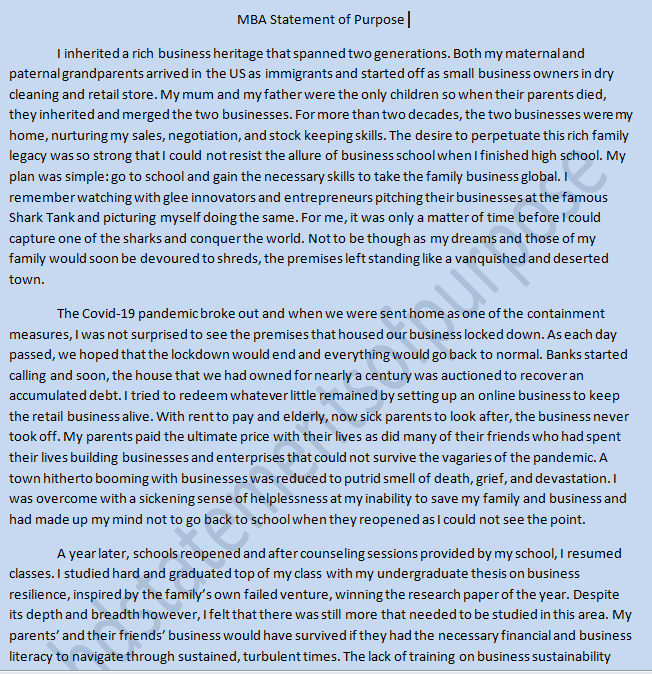
Statement of purpose sample for computer science 2

Statement of Purpose Sample in Cognitive Science
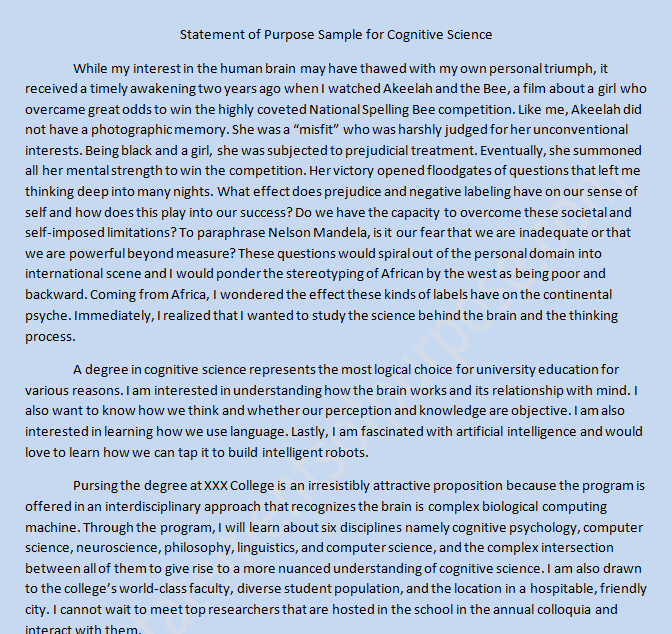
Statement of Purpose sample for mathematics
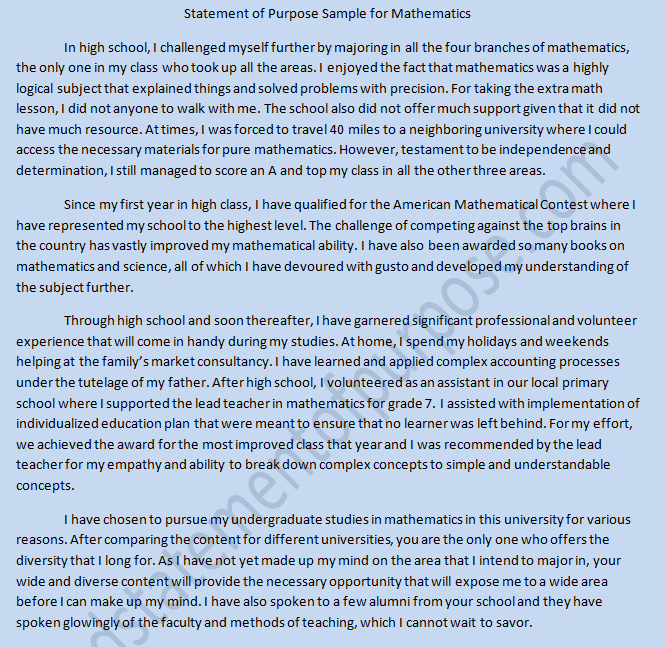
Statement of Purpose sample for MBA with Engineering Background
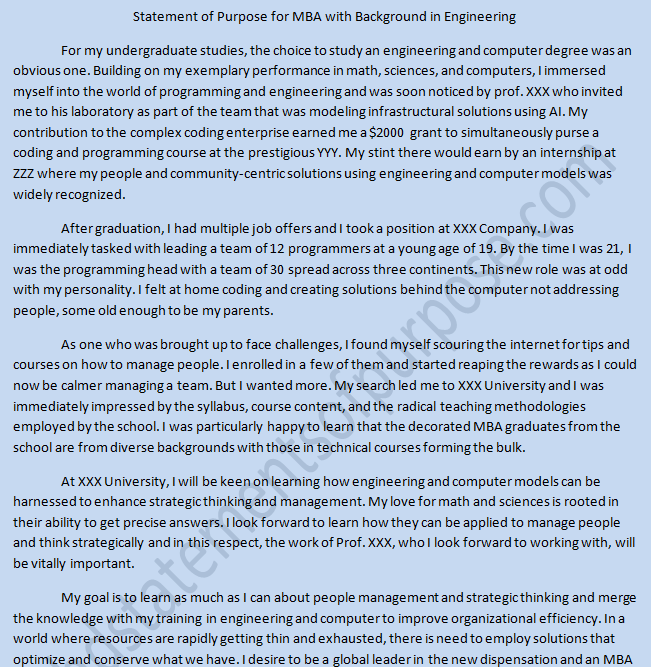
Statement of Purpose sample for Masters in Pyschology
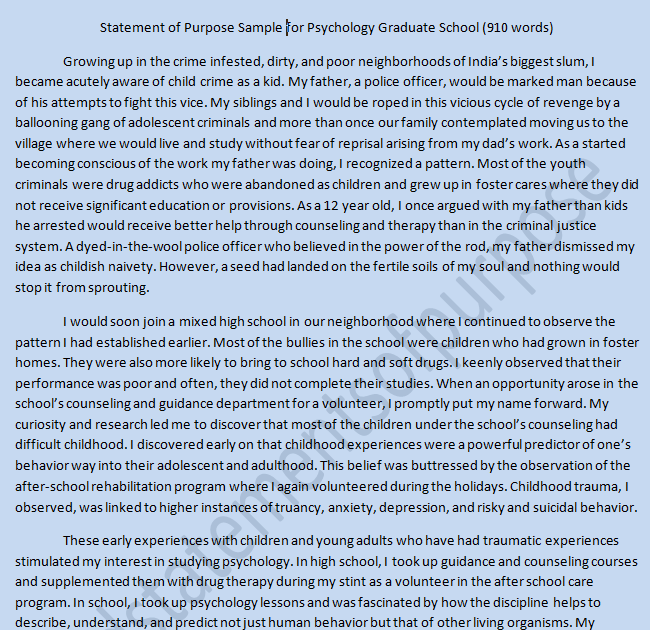
Statement of Purpose Sample for Computer Science
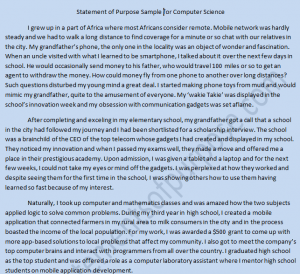
Statement of Purpose sample for Business Management
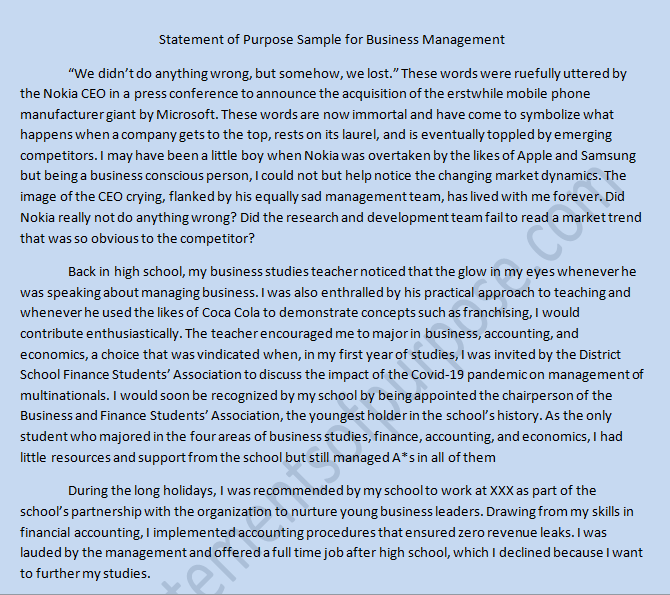
Statement of Purpose sample for Masters in Public Health
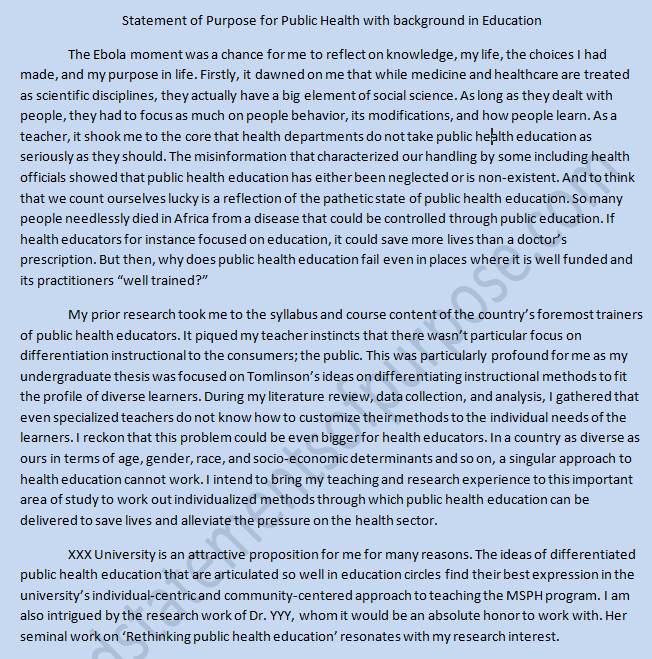
Statement of Purpose for MBA Sample (Ivy school)
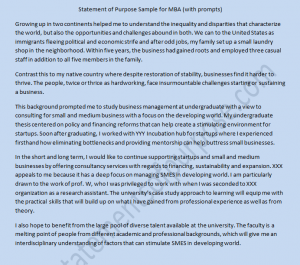
We also edit, review, and standardize other Admission Documents
Admission CV
Personal Statement
Recommendation Letter
Scholarship Essay
Motivation Letter
Cover Letter
Our Promise
- A SOP tailored to your program/university requirements
- Original, plagiarism free
- A SOP customized by an expert in your field
- Direct communication with assigned editor
- Proofreading and plagiarism check
- Punctuality
- Free revision for 2 weeks
- Confidentiality
- Money back guarantee

Let us Polish your Admission Documents
You don’t have to gamble an admission slot because of a low quality admission document. We’re the experts. You can count on us.
Expert SOP Help
- SOP for MBA
- SOP for Law Internship
- SOP for Tourism
- SOP for Social Work
- SOP for Graduate School
- SOP for Ph.D.
- SOP for Engineering
- SOP for Scholarship
SOP Edit & Review
- SOP Proofreading
- SOP Graduate School
- SOP for College
- SOP for PHD
- SOP for Information Technology
- SOP for MPH
- SOP Engineering
- SOP Medical
- SOP for Computer Science
What Our Clients Say
"After hours of staring at my computer screen and attempting to cobble up something together, I decided to try PhD Statements of purpose services. I enjoyed quite a peace of mind as they delivered a SOP that brought out exactly who I am. My nursing doctoral dream is now on course, partly because of the ivy standards services I received."
Michelle Stuart
“I Requested for an MBA SOP and I was quite nervous as I had never used the platform before. It's now my plug for all admission documents. Thanks a bunch."
I needed a Mathematics statement of purpose and an admission CV as quick as possible. These guys delivered these admission documents within hours of placing my orders. They reflected my individuality and I don't know how they did it. AMAZING!!
Dorothy Palmer
"I didn’t realize I could get such a quality Nursing PhD Statement of Purpose online. It was perfectly customized and individualized.Thanks for bringing me up closer to my doctoral program admission.<!-- wp:shortcode -->[learn_press_profile]<!-- /wp:shortcode -->
[learn_press_profile]

Statement of Purpose for Graduate School
Criteria for success.
- qualified for their program, and
- a good fit for their program’s focus and goals.
- You show a select group of skills and experiences that concisely convey your scientific accomplishments and interests.
- Your experiences are concrete and quantitative .
- Your personal statement is no more than 2 pages (less if you can, or if it is required by the school).
Structure Diagram
The graduate school Personal Statement (≈ Statement of Purpose ≈ Statement of Intent) is a document that complements your resume and application form, describing your profile in a narrative way and convincing the admission committee that you would be a good match for a particular department or program. Take into account that matching goes both ways: they should be interested in you, and you should be interested in them. Your personal statement should make this match clear.
Analyze Your Audience
Your personal statement will be read by a graduate committee – a handful of faculty from the program. They’re trying to determine if you will be a successful graduate student in their department and a successful scientist after you graduate. They are interested in your qualifications as a researcher, your career goals, and how your personality matches their labs and department.
The graduate committee probably reads hundreds of applications every year. To make it easy for them to figure out that you are a good fit, keep in mind the following suggestions:
- Make direct, concrete statements about your accomplishments and qualifications.
- Create a narrative that serves as a personal brand and helps them remember you.
- Give them some unique examples that describe you and make you stand out, and which will make them remember you as “that candidate that was so passionate about…” or “who has a lot of experience in…”, although they might not remember your name.
- Align your academic goals and motivations with specific research projects or research directions of the target department.
Assessing your match to the target program
A key point on writing your Personal Statement is to demonstrate that you have done previous research about the program to which you’re applying, that you understand its characteristics and objectives, and that you are really interested in joining it and willing to do your best to be successful in it. To do this:
- Read the program’s website. Learn about its faculty members and the projects they are working on. Check what topics and high level goals the department is committed to. Identify the main research areas.
- Get in contact with faculty and students in your target program. Browse recent publications and presentations but remember lab websites can be outdated and a publication may lag a few years behind the active research in a lab so pay attention to the motivation, direction, and methods of the faculty member over specific results. If you have had a positive discussion with someone at the department, you can include in your essay how those interactions confirmed that you would be a good match for the program.
Reflect before you start
To convince a graduate committee that you are ready for and excited about graduate school, first you need to be able to articulate this to yourself. Earnestly reflect on the following types of questions. A lack of authenticity is easy to detect.
- Why do I want to go to graduate school?
- How am I sure?
- Why will I be successful in graduate school?
- What can I do with the help of this degree that I couldn’t do before?
- Where do I want to be in a few years?
- How am I going to get there?
Create a personal narrative
Graduate programs invest in the professional and scientific growth of their students. Get the committee excited about investing in you by opening your essay with a brief portrait of what drives you as a scientist. What research directions are you passionate about, and why? What do you picture yourself doing in 10 years?
- E.g. “Graduate study is the first step towards my goal: I want to improve my ability as a researcher and gain more technical depth and breadth to maximize my impact. In the long term, I hope graduate school will better position me to be a leader in shaping the conversation about what problems can be addressed by mechanical engineers.”
Close your essay with a 2-3 sentence discussion of your long-term career interests. No one will hold you to this; this just helps your committee visualize your potential trajectory.
- E.g. “Above all else, a MIT PhD would help me achieve my long term career goal of becoming a professor, the position in which I can best see myself accomplishing my mission to show others the hidden beauty in everyday life through science.”
Connect your personal narrative to whichever degree you are applying to (be it research-based or course-work-based, or a Master of Science, Master of Engineering, or PhD). Especially in mechanical engineering, each of these degrees will enable different career trajectories and provide different educational opportunities. Articulate clearly why the degree you are applying for helps you achieve your goals. In the same vein, consider mutual benefit: what will you contribute to the academic community over your time at your target school? Remember, it all comes back to “qualified match” , no matter what level of degree you are applying for.
Describe your experiences
Experiences are the “what” of your essay. They are the most efficient and easiest way to prove your capabilities to the admissions committee.
- What experiences led you to develop your skill set and passions ?
- Where have you demonstrated accomplishment, leadership, and collaboration?
- Show your depth with a range of experiences: research, teaching, relevant extracurriculars and leadership positions.
- State concrete achievements and outcomes like awards, discoveries, or publications, or projects completed.
Achievements need not be limited to research projects or publications. Think about all the experiences that demonstrate your ability to conduct research and succeed within the structure of your target program. (Where have you demonstrated creativity? Self sufficiency? Perseverance? What open ended problems have you tackled? What enabled you to succeed at them?)
Quantify your experiences to show concrete impact. How many people were on your team? How many protocols did you develop? How many people were in competition for an award? As a TA, how often did you meet with your students?
For each experience you include, focus on how the experience affected you. Describe your actions, and always direct the message to highlighting your performance and growth (not how important the company was or how well-known the professor you TAed for is). Remember, it is not an essay about science, it is a personal essay—about you and how you have positioned yourself to succeed in graduate school.
Explain the meaning of your experiences
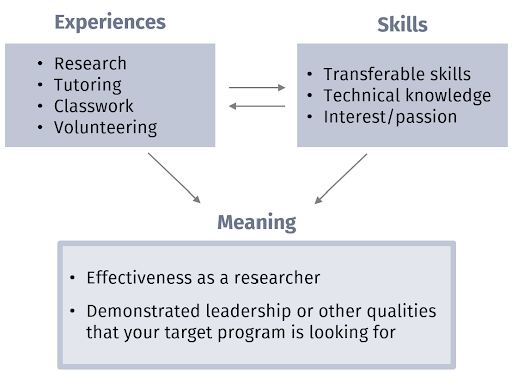
Your goal in sharing your experiences is to demonstrate that you have the qualifications, qualities, and drive needed to succeed in graduate school. Therefore, you will need to not only choose experiences wisely but also state specifically what they mean within the context of your application.
- Why was this experience important to your growth as a scientist?
- What did you gain from or demonstrate during that experience?
- How will this make you a better grad student?
Even if it feels obvious to you, you need to explicitly answer these questions to your audience. Here are some examples experiences that have been expanded to contain meaning:
Contemplate how disparate activities can be unified into a common narrative about your motivations and achievements. Articulate this clearly to make your statement cohesive.

Demonstrate your match to the target program
Using the research you did to assess your chosen programs, clearly articulate why you are a match . Consider both directions of the match: not only why you want to go to the school, but also why you would fit in well and contribute to the program.
State which professors in the program you would be interested in working with. Demonstrate that you have done your homework regarding the program. Show how their research areas align with your background and your goals. If you have had conversations with students or professors in the program, be sure to include that as well.
Common Pitfalls
Write about you , not your role models. One of the most common pitfalls we see in the Comm Lab is students writing touching Personal Statements about family members or role models who have inspired them. There is nothing wrong with including personal stories about people who have helped you understand yourself better, or positioned you to succeed in graduate school, but it is important to tread very carefully. Don’t leave the reader wondering why they are reading about someone else in a document that is meant to be about you. If you take time to talk about someone who positively affected you, make sure to be very clear about how that experience with that person molded you into a strong graduate school candidate.
Be judicious with childhood stories. A brief mention of some childhood experience that shaped your interests in STEM is probably okay, but if you talk about it at length (more than ~2 sentences), you are taking up space that should probably be used to talk about who you are today, not who you were over a decade ago.
Don’t simply restate your resume. Your Personal Statement should be a technical document (having evidence, numbers, and supporting facts) with personal outcomes (talking about your motivations, ambitions, and ability to succeed as a graduate student). Of course, you will reiterate parts of your resume in your Personal Statement , but what uniquely makes it a “Personal Statement” is the discussion of how those professional experiences affected you , as a researcher and person well-suited to the graduate program at X University.
Insufficient quantification of your experiences. We are all scientists and engineers; our line of work is inherently quantitative. Quantification is a quick and easy way to add context, lend credence to your experiences, and impress the reader. Even little quantifications can help: “I spent two semesters working on a project about…” is much better than “I spent some time working on a project about…”. See more examples in the section on Experiences, above.
Being a great student and having an impressive resume is only half the battle when it comes to graduate school applications. You need to be able to communicate and convince the committee that your personality and particular set of skills and experiences are well-suited to the graduate program you are applying for. This extends beyond graduate school applications: as scientists and engineers, we write papers and technical reports to communicate with our peers and convince them that our work is meaningful.
By reading this article, you have recognized the value of communication and are well on your way to crafting an effective and powerful Personal Statement. This is your opportunity to make yourself shine among all the other candidates, so make it count! You can do it!
Acknowledgements : This content was adapted from the NSE and CEE Communication Labs’ CommKits for graduate applications.
Resources and Annotated Examples
Annotated example 1, annotated example 2.
- Phone: +91 8466016171
- Whatsapp: +91 8208375580
- Email: contact@leapscholar.com
How to Write Statement of Purpose (SOP) for Ph.D. Admission: Sample & Example
- Updated On March 26, 2024
- Published In General
Every document is important in your PhD application when you present a profile to the admissions committee, AdCom. Each document, whether the Statement of Purpose (SOP), a research paper sample, research essay, resume, or Letter of Recommendation (LOR), can be a crucial factor or a tie-breaker when universities select candidates with similar profiles.
Table of Contents
Therefore, the statement of purpose for PhD is very important in the entire application procedure. This blog contains all aspects of the SOP for PhD, including its format and requirements for top universities.
How to Write SOP for Ph.D.
Writing a Statement of Purpose (SOP) for a PhD requires candidates to express their interest in the subject honestly and passionately. To help you create an impactful SOP, here are a few simple guidelines:
- Introduction: Start with a good introduction that catches the reader’s attention and clarifies your intention to pursue doctoral studies. Please describe your academic background and research interests briefly.
- Academic Background: Explain your academic path, highlighting relevant courses, research projects, publications and achievements in the field. Explain how these experiences have prepared you for your PhD studies and influenced your research interests.
- Research Experience: Tell us about any research experience, including internships, projects or cooperation. Tell us what you are doing, how you contribute, and what outcomes or insights you gained from this experience. Show your analytical and problem-solving abilities and your ability to collaborate independently.
The best guidance for your STUDY ABROAD DREAM
Start your journey with the best study abroad experts in India

- Future Goals: Define your long-term career objectives and how you can attain a Ph.D. that aligns with those goals. Explain how you will be able to achieve your objectives and contribute to your professional development by applying for this programme.
- Conclusion: Clarify your main points and reiterate your enthusiasm for this program. Let me finish by saying you are ready and eager to contribute to the academic community.
- Proofreading & Editing: Please review your SOP closely to see if you have any grammar, spelling, or typing errors. Ensure that everything is clear, coherent and concise at all times. To improve the quality of your SOP, consider seeking feedback from professors, mentors and colleagues.
Sample Statement of Purpose (SOP) for Ph.D.
Presenting key information to institutions in a structured manner is essential when searching for samples from the PhD SOP. Applicants should aim for a length ranging from 200 to 1000 words, tailored to the institution’s requirements when writing a PhD personal statement.
It’s important to strike the right balance; a statement should not be too lengthy, which can overload the reader, and it should not be too short, which could lead to a lack of clarity. To ensure that the message is effectively communicated, emphasis is placed on being concise yet informative.
Sample SOP for PhD: Sample 1
I grew up in Chandigarh and witnessed firsthand the effects of environmental degradation and climate change on our society. That experience awakened my passion for the environment, and I am determined to continue my studies in this area. I am excited to apply for the Master’s program in Environmental Studies at [University Name].
A commitment to understanding and dealing with environmental challenges shapes my academic journey. I’ve completed my undergraduate studies in environmental science and acquired a solid understanding of environmental principles and sustainable development.
I’ve had the opportunity to work with a wide range of organisations dedicated to protecting and developing our environment throughout my professional career. These experiences have given me valuable insight into the complex interaction between human activities and the natural environment.
I researched topics such as biodiversity conservation and adaptation to climate change because of my interest in environmental issues. One of my most memorable achievements was participating in the project to assess the impact of deforestation on local ecosystems in this region. This experience deepened my understanding of the importance of interdisciplinary approaches to environmental research.
In particular, my long-term objective in conservation biology and ecosystem management is to contribute to developing novel solutions for environmental problems. It will give me the knowledge and skills necessary to make a real impact in this area by studying for a master’s degree in environmental studies at [University Name].
The interdisciplinary approach and research opportunities offered by the Environmental Studies Programme at [University Name] are very attractive. I would be incredibly attracted to work with highly respected faculty members and participate in hands-on research activities. Given the alignment of my research interests and career goals, exploring specific topics related to the Specific Research Areas is especially important.
Lastly, I’m excited about continuing my studies at [University Name] and contributing to environmental studies. I’m sure I’m a strong candidate for the Master’s program because of my academic background, professional experience, and passion for protecting the environment. Thank you for considering my application.
Sample SOP for PhD: Sample 2
The dynamic world of business, and its profound impact on society, fascinated me as a young man. This fascination, coupled with a strong desire to make a positive difference through strategic leadership, has motivated my pursuit of a Master’s degree in Business Administration at [University Name].
I completed my undergraduate studies in Economics at [University Name], where I developed a solid foundation in economic theory and quantitative analysis. I’ve been equipped with a comprehensive understanding of market dynamics, financial principles and strategic decision making through my studies.
I have acquired valuable experience working in various roles within the financial services sector following my college studies. These experiences have given me a firsthand insight into the complexity of business operations, financial management and strategic planning. I’ve sharpened my ability to analyse, manage and work as a team through my roles.
I am well aware of the effective business leadership through my professional experiences. I’m passionate about using the principles of business to drive innovation, sustain long term growth and positively contribute to society. I will gain the necessary knowledge, skills and network to meet these objectives by completing my Master of Business Administration.
With its reputation for academic excellence, diverse student population and emphasis on Experiential Learning, the MBA program at The [University of Name] is particularly appealing to me. I’m looking forward to working with respected faculty members and fellow students, exchanging ideas as well as gaining a perspective from different points of view. In addition, I’m looking forward to participating in hands-on projects and internships that will strengthen my practical skills as well as industrial knowledge.
My aim is to take a leadership role in the business sector, where I can make an impact on organisational growth and innovation after completing my MBA programme. In the end, my objective is to set up a business which will contribute positively to both the economy and society with its focus on sustainability of economic practice and community entrepreneurship.
Finally, I want to develop my business management knowledge and skills in order to make a significant impact on the global economy. I’m confident that the necessary tools and opportunities to achieve my objectives will be provided by the MBA program at [University Name]. Thank you for your consideration of my application, and I’m delighted to be able to contribute to a lively academic community at [University Name].
SOP for Ph.D. Admission Requirements for Top Universities
The requirements for a Statement of Purpose (SOP) when applying for a PhD program at top universities remain consistent in terms of the general approach to writing. However, variations exist in structure, word limit, and other specific guidelines depending on the individual university’s requirements.
Here, we examine the SOP requirements for PhD applications at leading universities, per the QS World University Rankings 2024.
- 1. SDS and Non-SDS Visa Differences for Canada
- 2. SOP for Business Analytics
- 3. SX1 Visa
Writing a strong Statement of Purpose (SOP) is crucial for students applying to graduate programs. By using the tips and advice shared in this blog, you can effectively share your academic journey, interests, and goals with admissions teams.
Remember, a good SOP shows your passion and readiness for advanced studies. With careful attention and effort, you can create an SOP that stands out and boosts your chances of getting into your desired program.
For more guidance on how to write SOP for PhD, you can contact our LeapScholar Team.
Frequently Asked Questions (FAQs)
Q. what makes a good sop for a ph.d..
Ans. The applicant’s research interests, academic background and career objectives should be clearly stated in a good SOP for a Ph.D. To demonstrate their readiness for doctoral-level research and their contribution to the academic community, the SOP should strongly align the applicant’s interests with the programme’s offering. In addition, it should be well-written, concise and in line with the specific programme and its requirements.
Q. What are some of the mistakes you should avoid in an SOP?
Ans. Avoiding typical mistakes when drafting an a SOP statement of purpose is essential. Stop using generic language and cliches that do not promote your individuality. Ensure your SOP is tailored to each program, demonstrating an understanding of their unique offers and how you fit in with the school community. Focuses on the relevant experience and achievements, omitting irrelevant details.
Q. What is the importance of SOP for a Ph.D.?
Ans. In the case of Ph.D. admission, the statement of purpose of the SOP provides candidates with the opportunity to demonstrate their academic background, research interests and career aspirations. This enables applicants to demonstrate their compatibility with the programme’s objectives and faculty expertise, giving admissions committees valuable insight into whether they are suited for advanced research or a career in academic studies.
Q. How do I write a SOP for college admission?
Ans. When writing the Statement of Purpose (SOP) to be admitted into college, make sure that you highlight your academics, career aspirations and why you are a good fit for this program. Indicate the relevant experience, skills and achievements that align with your objectives while explaining how college resources and opportunities will meet them. Keep the SOP brief well-organised and tailored to the specific college or program you’re applying to.
Q. How do I start an SOP sample?
Ans. To start a SOP sample effectively, consider opening with a compelling anecdote, a personal reflection, or a statement of purpose that succinctly articulates your motivation and passion for the chosen field of study. This will set the tone for the rest of the document and draw the reader’s attention from the beginning.
Q. What is the format for the SOP statement?
Ans. The format for a Statement of Purpose (SOP) typically includes an introduction, body paragraphs, and a conclusion. This introduction should provide an overview of your background and interests. Paragraphs should be added to the body highlighting your experiences in academia and industry, as well as particular successes and motivations. Lastly, the conclusion should summarise your main points and express your enthusiasm for this programme.
Q. Can I reuse an SOP for different Ph.D. programs?
Ans. While it is possible to apply the same overarching theme or experience to each SOP, it is essential to adapt each SOP to the specific requirements of the programme, the faculty, and the research opportunities. Using the same SOP without modifying it can be seen as generic and lacking genuine interest in the program. Personalising each SOP demonstrates your commitment and understanding of how you will align yourself with the goals and features of every program.
Q. Can I mention my weaknesses or challenges in my SOP?
Ans. Generally, it is best not to mention weaknesses or problems explicitly in your Standard Operating Procedures. Instead, focus on highlighting your strengths, experiences and accomplishments. However, if you have overcome significant challenges that have shaped your academic journey or personal development, you may briefly mention them to demonstrate resilience and growth. Frame such experiences positively, emphasising what you learned and how it has strengthened your resolve to pursue your academic goals.
Q. How long should my SOP be?
Ans. Your Statement of Purpose (SOP) should be approximately one to two pages in length or between 500 and 1,000 words. Emphasising your academic background, research interests, career objectives, and why you are a strong candidate for the programme is essential. Keeping to the specified word count will ensure clarity and keep readers engaged while giving enough information about your qualifications and reasons for doing so.
Q. What tone and writing style should I use in my SOP?
Ans. Keep your SOP professional and formal, but also add personality and enthusiasm to your chosen area of interest. To effectively communicate your motivation, experience and aspirations, you must be able to do so in a language that is easy to understand. As the Standard Opinion Paper is an official document for academic evaluation, do not be overly informal or superficial.
Q. How can I make my SOP stand out from other applicants?
Ans. Make your SOP stand out by highlighting unique experiences, points of view and motivation. Share specific examples to highlight your achievements, skills, and passion in this area. Furthermore, demonstrate a deep understanding of the programme and show how your interests align with its objectives. Lastly, you must write a persuasive story which will appeal to the reader and give your candidacy an indelible impression.
Popular Universities for Study Abroad
30+ universities for study abroad.
- Arizona State University
- Northeastern University
- Coventry University
- University Of East London
- University Of Hertfordshire
- Conestoga College
- Humber College
- Centennial College
- University Of Birmingham
- Stanford University
- University Of Greenwich
- Columbia University
- Bpp University
- Texas A & M University
- University Of Maryland
- University Of Toronto
- University Of Melbourne
- University Of Waterloo
- New York University
- Mcgill University
- Harvard University
- University Of British Columbia
- University Of Alberta
- University Of Oxford
- University Of Cambridge
- University Of California Berkeley
- Yale University
- University Of Calgary
- Massachusetts Institute Of Technology (MIT)
Popular Blogs
Cgpa to gpa: check how to convert 10 point cgpa to 4 point gpa, check how to calculate percentage to cgpa.
- Top 10 Toughest Exams in the World 2024
Saket Kohli
An International Higher Ed professional with 7+ years of experience studying, working, and living across three geographies, currently on a mission to share his journey as an International Student.
Related Posts

10 Countries With Free Education For International Students

Trending now

Statement of Purpose Examples: Two Graduate Applications

Applying to graduate school excites and challenges applicants. It demands a Statement of Purpose (SOP) that weaves your academic journey, professional goals, and unique contributions into a compelling narrative. Far from a mere formality, the SOP serves as your distinct voice among countless applicants, telling your unique story. This article presents expert feedback on two real student statement of purpose examples, guiding you to craft your standout document.
Successful Statement of Purpose Examples
We’ve curated a special feature to guide you through crafting a statement of purpose that stands out. We present two SOPs from graduate students each embarking on distinct academic adventures. Their stories are annotated with expert feedback from our seasoned admissions consultants.

Statement of Purpose #1: First, this SOP for SUNY Buffalo explores finance, showcasing a passion for financial markets and their global impact. It recounts overcoming challenges and making innovative contributions to financial econometrics, highlighting resilience and curiosity. Our experts spotlight its strengths, including a strong narrative and detailed examples, and suggest areas for refinement to enhance clarity and impact.

Statement of Purpose #2: Secondly, this statement of purpose for Tufts explores international affairs, showing a dedication to ethical global development and security. It traces the applicant’s journey from a pivotal experience in Nicaragua to a dedicated career in development and security. Our experts emphasize the engaging storytelling and focused narrative, recommending adjustments for consistency and depth to boost its persuasive impact.

Elevating Your SOP: Expertise and Support at Your Fingertips
At Magoosh, we understand the critical role a statement of purpose plays in your graduate school application. As such, we have personal experience writing successful SOPs for our own graduate applications. Whether you’re navigating the complexities of financial markets or aspiring to make a global impact in international affairs, our guidance is designed to highlight your unique story and academic ambitions.
We invite you to dive into the detailed annotations and feedback provided for each statement of purpose example. These insights are a window into the meticulous crafting of an SOP that not only meets but exceeds expectations. Our blog is a treasure trove of resources , tips, and strategies for prospective graduate students, embodying our commitment to supporting your academic and professional journey.
In conclusion, writing a statement of purpose can be overwhelming. However, with the right guidance and resources, your SOP can make your potential and aspirations shine. Explore our blog, engage with our experts, and let us help you articulate your purpose with conviction and clarity. Your dream graduate program is within reach, and your story deserves to be heard.

View all posts
More from Magoosh

Leave a Reply Cancel reply
Your email address will not be published. Required fields are marked *
- HILS Preview Weekend
- Dissertation
- Fellowships
- Maximizing Your Degree
- Before You Arrive
- First Weeks at Harvard
- Harvard Speak
- Pre-Arrival Resources for New International Students
- Alumni Council
- Student Engagement
- Applying to Degree Programs
- Applying to the Visiting Students Program
- Admissions Policies
- Cost of Attendance
- Express Interest
- Commencement
- Diversity & Inclusion Fellows
- Student Affinity Groups
- Recruitment and Outreach
- Find Your Financial Aid Officer
- Funding and Aid
- Financial Wellness
- Consumer Information
- Applying to a Life Sciences Program
- Choosing a Life Sciences Program
- Why Choose Harvard?
- Policies (Student Handbook)
- Student Center
- Title IX and Gender Equity
Important Dates
- Application Opens: April 15, 2024
- Application Deadline: June 17, 2024 at 5:00 p.m. ET
- HILS Preview Weekend: September 26-28, 2024
Please read the program description, eligibility criteria, and application instructions before beginning your application.
Program Description
The goal of the Harvard Integrated Life Sciences (HILS) Preview Weekend is to provide an in-person academic professional development and community building experience for prospective HILS PhD program applicants who have not previously had the opportunity to visit Harvard and become familiar with its programs and resources. Core to the mission of the HILS Preview Weekend is the promotion of equity, diversity, inclusion, and belonging in STEM.

At the HILS Preview Weekend, participants will:
- connect and network with HILS PhD program students, staff, and faculty
- gain insights into the application process and how to prepare a strong application for HILS PhD programs
- learn about resources, support, and the life sciences research environment at Harvard
- explore the city of Boston.
Lodging, airfare, and all meals are covered for HILS Preview Weekend participants.
Eligibility Criteria
Eligible applicants must meet all of the following criteria:
- US citizens, permanent residents, or non-US citizens with DACA
- individuals who will be applying to PhD programs in the life sciences in 2024
- must be available to attend the entire in-person program.
Individuals ineligible for the HILS Preview Weekend include those:
- who have participated in summer research, postbaccalaureate, or other outreach programs at Harvard, its affiliated hospitals and/or institutes
- who are current or former research assistants or master's students at Harvard or its affiliated institutes.
Please note that applications that do not meet these eligibility criteria will not be considered.
Who Should Apply?
- college seniors, postbaccalaureate students, research assistants, master's students, and STEM professionals
Individuals with:
- a demonstrated interest in pursuing a PhD in the life sciences
- a strong interest in HILS PhD programs
- prior hands-on research experience in a wet lab or dry lab environment.
We especially encourage applications from students who are from underrepresented or disadvantaged backgrounds (see also NOT-OD-20-031 ). Applications are open to all, and HILS does not consider race, ethnicity, or national origin in reviewing applications.
Application Components
The HILS Preview Weekend application consists of the following components:
- personal, academic, and research background
- unofficial transcripts
- statement of purpose – see instructions below
- personal statement – see instructions below
- a letter of recommendation (from a faculty member in whose laboratory you have performed research) – see instructions below
- resume – see instructions below
- Note: There is no application fee for the HILS Preview Weekend.
Please note that incomplete applications will not be reviewed.
Stay tuned for the launch of the application!
Statement of Purpose (750 words max)
Your statement of purpose should be clear, concise, and coherent, including all of the following components.
- Describe your reasons and motivations for participating in the HILS Preview Weekend and pursuing a PhD in your chosen field(s), including how you will benefit from the HILS Preview Weekend.
- Briefly indicate your career objectives.
- the central question and/or hypothesis driving each of your research projects or research experiences
- key methods, results, and conclusions
- your specific experimental and intellectual contributions to the work.
Your statement should be free from spelling or grammatical errors, well structured with transitions, labeled with your first and last name, and comprehensible for someone who is not an expert in your field. Please upload your statement of purpose as a PDF.
Personal Statement (500 words max)
A core part of the Harvard Griffin GSAS mission is to identify and attract the most promising students to form a dynamic and diverse community. We are committed to training individuals who reflect the growing diversity of society today and who will contribute to our commitment to sustain a welcoming, supportive, and inclusive environment. Please briefly describe your personal journey to graduate education and how your experiences have impacted your decision to pursue graduate study. In addition, please describe any personal experiences in your education or upbringing—including opportunities, hardships, or obstacles—that you believe to be pertinent to your application.
Letter of Recommendation
Please have a faculty member in whose lab you have conducted research submit a letter of recommendation for you, describing and discussing (1) your work in their laboratory, (2) academic performance, (3) intellectual potential, (4) motivation for graduate study, (5) creativity and originality, and (6) other qualities that make you a strong candidate for PhD programs in the life sciences.
Note: You are responsible for ensuring that the faculty member writing your letter of recommendation submits it by the application deadline. Applications without a letter of recommendation will be considered incomplete and will not be reviewed.
Resume (1-2 pages)
Your resume should include a brief overview of the following elements, as applicable: your relevant education, research experience, laboratory skills, teaching experience, presentations, publications, honors and awards, and relevant leadership, outreach, and extracurricular activities. Resumes that are longer than two pages will not be reviewed.
Harvard Integrated Life Sciences
Share this page, explore events.
Your browser is unsupported
We recommend using the latest version of IE11, Edge, Chrome, Firefox or Safari.
Graduate College
The purpose and value of positionality statements.
Five reasons to include them in your writings, as well as some potential pitfalls to consider
Never heard of positionality statements? Neither had we until our instructor asked us to explore them in the context of educational leadership and instructional technology. Our research revealed that positionality statements can tell us important information about the author because they describe the author’s worldview and how it influences their work. The author writes such a statement in an attempt to provide context and transparency about their specific connections to the research for readers. However, we found that including these statements in the context of research reports is not a common practice, and only a select few scholars bear the burden of publishing their positionalities.
We are two educational leadership doctoral students concentrating on media, technology and learning design. Currently, we hold positions at four-year universities in the southeast region. The following is a merging of our independent research, which includes a review of positionality statements, a list of reasons to use them and some potential concerns.
A researcher’s positionality is their worldview on a research question or topic. It can include declarations of beliefs, methodological preferences and existing or latent biases. What makes a researcher’s positionality so important is that it can shape their epistemology (what can be known), ontology (the nature of reality), methodology (process and procedures), and ultimately the interpretation of their research results by others, as various scholars— such as, Mark Fathi Massoud , Andrew Gary Darwin Holmes , Bryan C. Clift and his coauthors , and Dongxiao Qin —have noted.
One important way to help articulate a researcher’s positionality and the identification of potential biases or subjectivities is through the practice of reflexivity: the ongoing process of a researcher critically examining their own actions, beliefs and motives in an effort to protect the research process. For example, one of us, Jessica, acknowledges that her position as a librarian and instructional technologist, combined with her education and commitment to equitable experiences and opportunities for all, influences her positionality. The other of us, Tracy, recognizes that her roles as a faculty member and instructional designer—in conjunction with her years of advocacy for diversity, equity and inclusion—all impact her positionality.
Positionality statements are often present in qualitative research in the social sciences but not widely included in instructional technology and other disciplines, which is problematic.
We think they can play an essential and integral part in reporting on research within other fields and higher education more broadly. Here are our five reasons why researchers should consider using positionality statements and our suggestions for their use.
No. 1: Positionality statements offer transparency about the background and potential motivation of the researchers. For example, in her article, “When the Music Changes, So Should the Dance,” Cynthia B. Dillard, now dean of the College of Education at Seattle University, proposed an endarkened feminist epistemology, so it makes sense that she would offer her positionality as an African American woman interested in culture and spirituality. She states, “I will suggest that for researchers of color in particular, there are deep and serious implications in choosing to embrace paradigms that resonate with our spirit.” It would almost seem disingenuous for her not to acknowledge her positionality when proposing this new epistemology.
But positionality statements can be useful in a wide variety of research fields. Anisa J.N. Jafar , from the University of Manchester, describes the value of such statements in quantitative as well as qualitative research, as Roehl Sybing at Doshisha University in Japan does in ethnographic research writing.
No. 2: Including positionality statements in research reports is an approach to equity. Marginalized populations tend to include position statements in their works more often than any other population. Furthermore, without these declarations, interpretations will likely skew to a Eurocentric view, as scholars including Massoud, Saran Stewart , and H. Richard Milner IV have noted.
No. 3: Positionality statements can increase the ethics, validity, accessibility and usefulness of the research . They allow for the continuation or replication of research as scholar-practitioners consider what they might do differently in another context. For example, Andrew Gary Darwin Holmes at the University of Hull in England has examined the cultural insider-outsider designation and how a researcher’s status might change over time. As a researcher spends more time with the participants in an ethnographic study, for instance, their status will likely morph from one of cultural outsider to the spectrum of cultural insider. Acknowledging this change is vital to the integrity of the research.
No. 4: Training students and researchers to think about their insider status can improve the rigor of the research. It can be empowering for students to liken positionality to their epistemology. Such training would, in the words of Christina Chavez at California State Polytechnic University, allow researchers to “verify or falsify their assumed interpretations.” Furthermore, Kim Miller of Bridges Academy Los Angeles argues, “... folklorists must clarify their own intentions and consider how their own multifarious roles and identities affect their fieldwork procedures and the way they write about their research.” Additionally, David Takacs of the UC Hastings College of the Law says that training researchers to think reflexively about their insider status would allow them to separate the information that they “know” from the information they “see.” For example, recognizing the knowledge we bring to the research process allows us to see other’s diverse lived experiences.
No. 5: Including one’s personality traits may be more beneficial than positionality statements alone. What could be more helpful to the research process and future readers is the researcher’s personality. Awareness of and documenting one’s personality traits may be more powerful than a list of phenotypic attributes or biases and may be more successful in developing rapport with participants. Indeed, when doing fieldwork in Indonesia, Sarah Moser found that what mattered more was her personality , not her positionality. She argued that individuals in the village judged her more on her social skills, emotional responses, interest in local events and how she “navigated the personalities of others.” What mattered less was her positionality as a white, Canadian, female graduate student, and being middle class, which she describes as “… impersonal externally defined categories.” Researchers should consider including personality traits in their positionality statements to help develop authentic relationships.
While including positionality statements has these strong benefits, authors should also consider several important factors. For example, while stating one’s positionality is an attempt to be transparent about potential biases when interpreting results, not all researchers participate in this practice. As stated previously, it is the researchers who typically come from marginalized populations who bear the burden of communicating their positionalities. And when women, queer and people of color, for example, express their positionalities or share their experiences in their work, they not only open their research to scrutiny, according to Massoud, a professor at the University of California at Santa Cruz, but they open their personal lives to scrutiny, as well.
Additionally, when publishing their positionalities, authors can share deeply personal and traumatic stories that threaten to retraumatize them. As Massoud states, “These harms do not merely accrue when marginalized scholars speak about their own positionality; they also accrue when scholars from majority populations do not speak about theirs, because that omission renders positionality peripheral to mainstream socio-legal scholarship.” Furthermore, as the University of Cardiff’s Sara Delamont has observed, when stating one’s positionality, the author/researcher cannot regulate how the readers will interpret their stance and how their work is read.
Stating one’s positionality is not common outside the social sciences, perhaps because of the conceptual nature of many of the articles, or maybe positionality statements are viewed as unnecessary in technology research and similar fields. We recommend scholars from all disciplines include positionality statements in their publications to help diminish the burden on marginalized populations. In addition, training future researchers to acknowledge their insider statuses will result in more objective investigations. Even if researchers do not include formal positionality statements in their reports and share their limitations or shortcomings, we hope that, as part of their research journey, they are at least engaging in reflexivity so as to make informed and inclusive scholarly decisions.
Tracy Peña is an instructional designer and lecturer at the University of North Carolina, Wilmington. Jessica O’Brien is associate librarian and coordinator of instructional technology at Lenoir-Rhyne University. They are both concluding a doctoral program in educational leadership at Appalachian State University, with a concentration in media, technology and learning design.
Original article: https://www.insidehighered.com/opinion/career-advice/2024/03/22/five-reasons-include-positionality-statements-your-writing-opinion

IMAGES
VIDEO
COMMENTS
A PhD statement of purpose gives admissions committees an introduction to your research interests and why their specific program is of interest to you. Like a cover letter for a job application, a great statement of purpose allows you to highlight your strengths, interests and experience. If you need statement of purpose advice, keep reading ...
The statement of purpose is usually the only part of the applicant's file where one can find strong evidence of whether the program will really mesh with the applicant's interests and ambitions. If you devote the statement to a list of the things the great things you have done, then you will merely exasperate the reader.
Your statement of purpose for PhD must express your sincere interest in the subject matter. The following 10 tips will help you to draft an impactful SOP: 10 Steps to writing an SOP for a PhD course . Introduce yourself: The whole purpose of the essay is to show the university who you are and your goals. It is better to get straight to the ...
1. Brainstorm your ideas. First, he says, try to reframe the task at hand and get excited for the opportunity to write your statement of purpose. He explains: "Throughout the application process, you're afforded few opportunities to address the committee directly. Here is your chance to truly speak directly to them.
It makes sense for a PhD statement of purpose sample to be longer than a master's degree statement of purpose—there's more to lay out in terms of research interests! The writing style is fairly straightforward—there's definitely a stronger focus on delivering content than flashy writing style. As Economics is a more quantitative ...
Universities often ask prospective students to provide a personal statement for PhD study. This is likely to be a key part of your PhD application.. Whereas your research proposal explains the potential of your project, your personal statement (also known as a PhD statement of purpose) demonstrates your suitability for doctoral work in general.. Writing a PhD personal statement can seem ...
Essential Tips. 1. What the admissions committee will read between the lines: self-motivation, competence, potential as a graduate student. 2. Emphasize everything from a positive perspective and write in an active, not a passive voice. 3. Demonstrate everything by example; don't say directly that you're a persistent person, show it. 4.
A statement of purpose (SOP) is a critical component of most graduate school applications, and are often required for various types of graduate level programs, including Graduate Certificates and Master's Degrees. An SOP offers you the opportunity to showcase your motivations, qualifications, and aspirations to a school's Office of Admissions.
The statement of purpose (also known as a statement of intent or motivation letter) is your chance to stand out from the crowd and showcase your motivation, skills and potential. It should: Outline your academic or professional interests and goals. Discuss relevant skills, experience and achievements. Demonstrate why you'd be a good fit for ...
3. Make your statement of purpose unique. While it's important to be focused, there's no need to be boring. To distinguish your essay, add unique (yet relevant) information. One of the best ways to do this is to discuss—briefly—an idea in your field that turns you on intellectually. It's an effective essay-opener, and it lets you write ...
The statement of purpose, sometimes called a personal statement, is an essential part of PhD applications. It functions similarly to a cover letter; it should convince the reader (in this case the selection committee) that you have the right qualifications, motivation and professional goals to pursue graduate studies in their program.
Header. Your letter of intent should follow the format of a formal business letter, which includes the name and address of the person you're addressing, the date, and a formal salutation. Typically, you'll want to find each program's graduate director and address your letter to them, using the program's or department's mailing address ...
Express clearly and concisely. As demonstrated in the statement of purpose for PhD samples above, writing an essay that is clear and concise necessitates a logical structure and a succinct, yet compelling language. Use simple, direct language, focusing on precision and clarity. Be mindful of wordiness and redundancy, as these can dilute your ...
The Statement of Purpose is your opportunity to show the admissions committee your commitment to education and to pursuing graduate study at HGSE. You are encouraged to share parts of your personal story, especially those that relate to your decision to work in education or your experiences in the field. A strong Statement of Purpose will ...
Prompt: Describe your reasons for pursuing graduate study in the Psychology program, your research interests, how your previous studies and experiences have prepared you for the program, as well as your career objectives and how the graduate degree will advance them. (500-1000 words) Statement of Intent:
Statement of Purpose . If admitted, I intend to pursue the Ph.D. in Curriculum and Instruction on a part-time basis (at least initially) and thus would not be eligible for a Graduate Assistantship. My ultimate goal is to complete my doctorate so that I can teach future teachers, conduct research within the classroom, and make a ...
Follow these steps to write an effective statement of intent: 1. Introduce yourself. To begin your statement of intent, introduce who you are and explain why you're applying for that particular graduate program. Be specific about the program to show that you've carefully considered your academic course of study and have a desire to start your ...
Statement of Purpose (SOP) for PhD programs [FREE Template] When applying for a PhD program, you must do 2 things as pre-work: 1.) Make sure you are convinced that PhD is the right choice for you; 2.) Make sure you have identified the ideal supervisor. Once that much is done, the next step is preparing your application packet to start applying ...
5. Do Not Focus on Teaching. PhD programs are all about training you to do high-quality, independent research. That is the purpose. In your statement, an emphasis on a love for teaching can be detrimental if it comes across as your primary objective. It is true that having a PhD qualifies you to become a university instructor.
PhD Statements of Purpose > Samples. Some of these samples have been accepted by top programs. They have been graciously shared by past applicants for educational purposes. We hope they inspire you to write your own. Drop us a draft of your SOP, PS, LOI, ML, &/or LOR for. Expert 1 v 1 Guidance (includes reviewing and editing)
Graduate School Statement of Purpose Example #9 (1705 words) A statement of purpose is a chance to tell the story of your life. Your statement is not only a celebration of your triumphs, but also a true reflection on the challenges and struggles you have faced. Remember, you cannot victimize yourself in the essay.
The graduate school Personal Statement (≈ Statement of Purpose ≈ Statement of Intent) is a document that complements your resume and application form, describing your profile in a narrative way and convincing the admission committee that you would be a good match for a particular department or program. Take into account that matching goes ...
Statement of Purpose 1. Notice that this writer does not begin with a personal anecdote? The approach here is powerful in part because it allows a central, guiding question to inform the writer's plans for future scholarship. This fits the guiding principle that personal statements are narratives of professional development, but it resists ...
Writing a Statement of Purpose (SOP) for a PhD requires candidates to express their interest in the subject honestly and passionately. To help you create an impactful SOP, here are a few simple guidelines: Introduction: Start with a good introduction that catches the reader's attention and clarifies your intention to pursue doctoral studies ...
Statement of Purpose #2: Secondly, this statement of purpose for Tufts explores international affairs, showing a dedication to ethical global development and security. It traces the applicant's journey from a pivotal experience in Nicaragua to a dedicated career in development and security.
Statement of Purpose (750 words max) Your statement of purpose should be clear, concise, and coherent, including all of the following components. Describe your reasons and motivations for participating in the HILS Preview Weekend and pursuing a PhD in your chosen field(s), including how you will benefit from the HILS Preview Weekend.
Anisa J.N. Jafar, from the University of Manchester, describes the value of such statements in quantitative as well as qualitative research, as Roehl Sybing at Doshisha University in Japan does in ethnographic research writing. No. 2: Including positionality statements in research reports is an approach to equity.